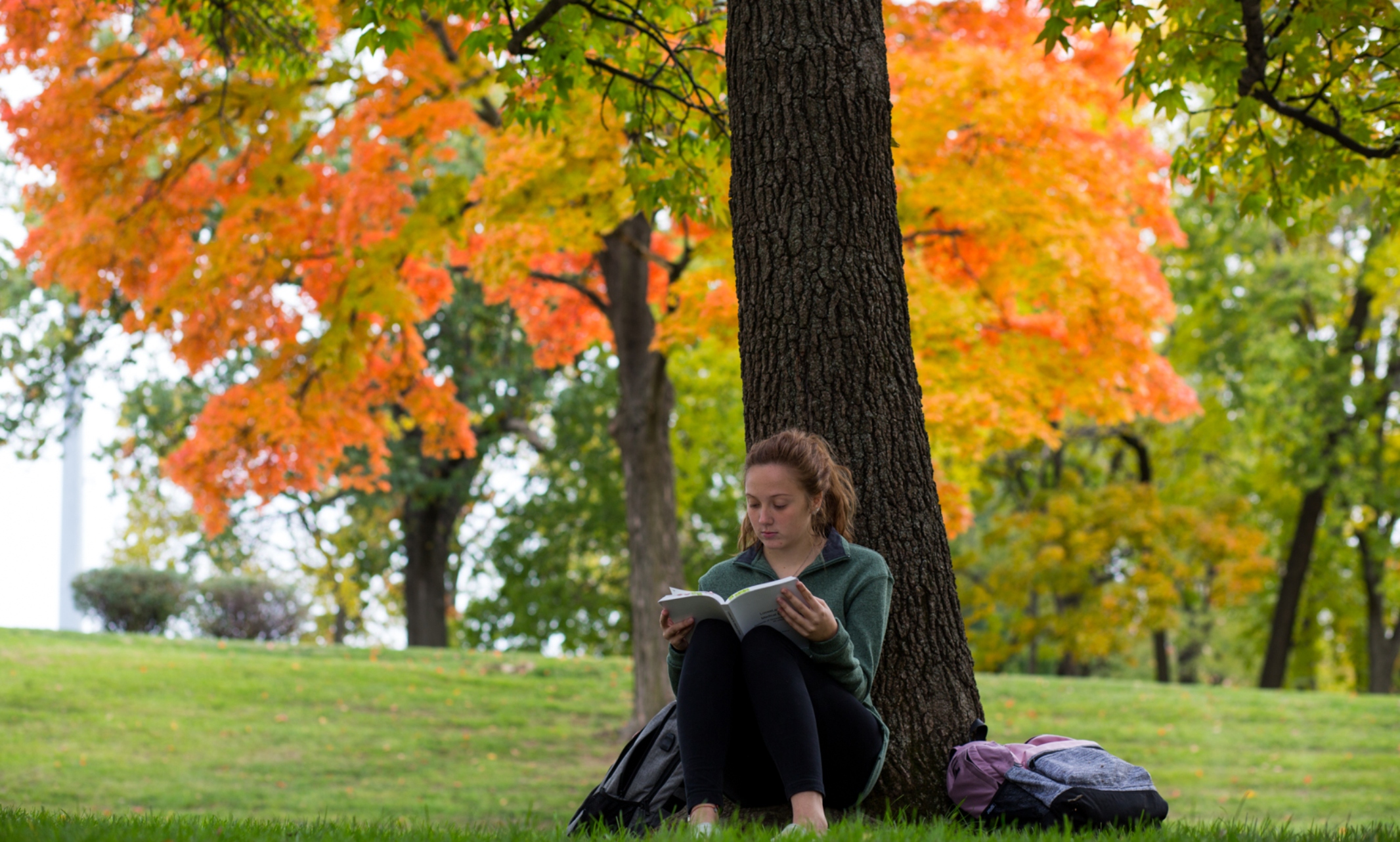
An interview with the UMKC counseling director about coping with school, life and COVID-19
The strain of managing school combined with the personal and global effects of the ongoing coronavirus pandemic may be unavoidable. But there are resources available to help manage stress and anxiety.
Arnie Abels, Ph.D., director of Counseling, Health, Testing and Disability Services at UMKC, suggests strengthening your assets may help you manage your emotional needs.
“One thing to remember is that every experience is individual,” Abels said. “People may need to figure out how to get enough sleep, the best way to exercise and create a routine. Others’ primary concerns may be financial as they try to find jobs and possibly change living situations.
All of this is valid. Each of us needs to understand that all of these things are important and manage our own individual emotional needs.”
“One thing to remember is that every experience is individual.” - Arnie Abels
He notes that returning students may be feeling completely differently than freshmen.
“For college students who are on campus for the first time, adjusting to everything new can be exciting and challenging,” Abels said. “Returning students may be frustrated and disappointed that campus life is still disrupted.”
Abels cautions about turning to substances for relief.
“First, smoking cigarettes or cannabis creates vulnerability in your lungs, which we all need to avoid,” he said. “We don’t judge, but we want to encourage people to make healthy choices. There’s nothing wrong with having a drink – if you’re of legal age – but drinking to excess can create difficult situations with difficult consequences, especially if you are using it to avoid feelings.”
There are healthier ways to deal with stress.
“Getting enough sleep is very important,” Abels said. “One of the things that may help with this is regular exercise. Eating healthy will feel better. But not everything needs to be productive. Along with online exercise videos, Swinney Rec is offering a video-gaming competition. That could be a great escape as well.”
Abels encourages people to take the opportunity to see how we can grow and become better individually and as a group.
“Personally, I’ve written letters to the people I care about. It’s a creative process for me and it allows me to let people know in a way that may be out of the ordinary and may be more special than an email or text.”
Mental Health Resources
Personal counseling
Counseling Services provides several opportunities for students. Walk-in crisis hours for any student weekdays at 10 a.m. and 2 p.m. Most group meetings are available on-line and counseling appointments are telehealth as well. Mind Body Connection will be reopening with limited services as soon as student staff workers are hired.
Movement Matters
Fitness classes available on campus, Instagram stories and Esports including PS4 and X-Box Fifa and Madden
Help at Your Fingertips
The Sanvello app provides on-demand help for stress, anxiety and depression, including videos for coping with COVID-19.
Additional Resources
Roos for Mental Health has additional resources, including the recordings of their topical lunch-n-learns.
Disability Services is open from 8:30 a.m. to 5 p.m. Monday through Friday, but the office is encouraging virtual visits. To set up an Accommodations Plan or address questions about accommodated exams or notetaking, details are available on the site.
The Employee Assistance Program has a wide range of resources related to both work and life, including tools for coping with COVID-19.
The Suicide Prevention Hotline is 1-800-273-8255 (TALK.)
Sep 24, 2021
People of color concerned about being racially profiled for wearing masks.
Jamila Jefferson-Jones, UMKC Interim Director of Black Studies commented on concerns about mask use and racial profiling. Read the story here.
Apr 30, 2020
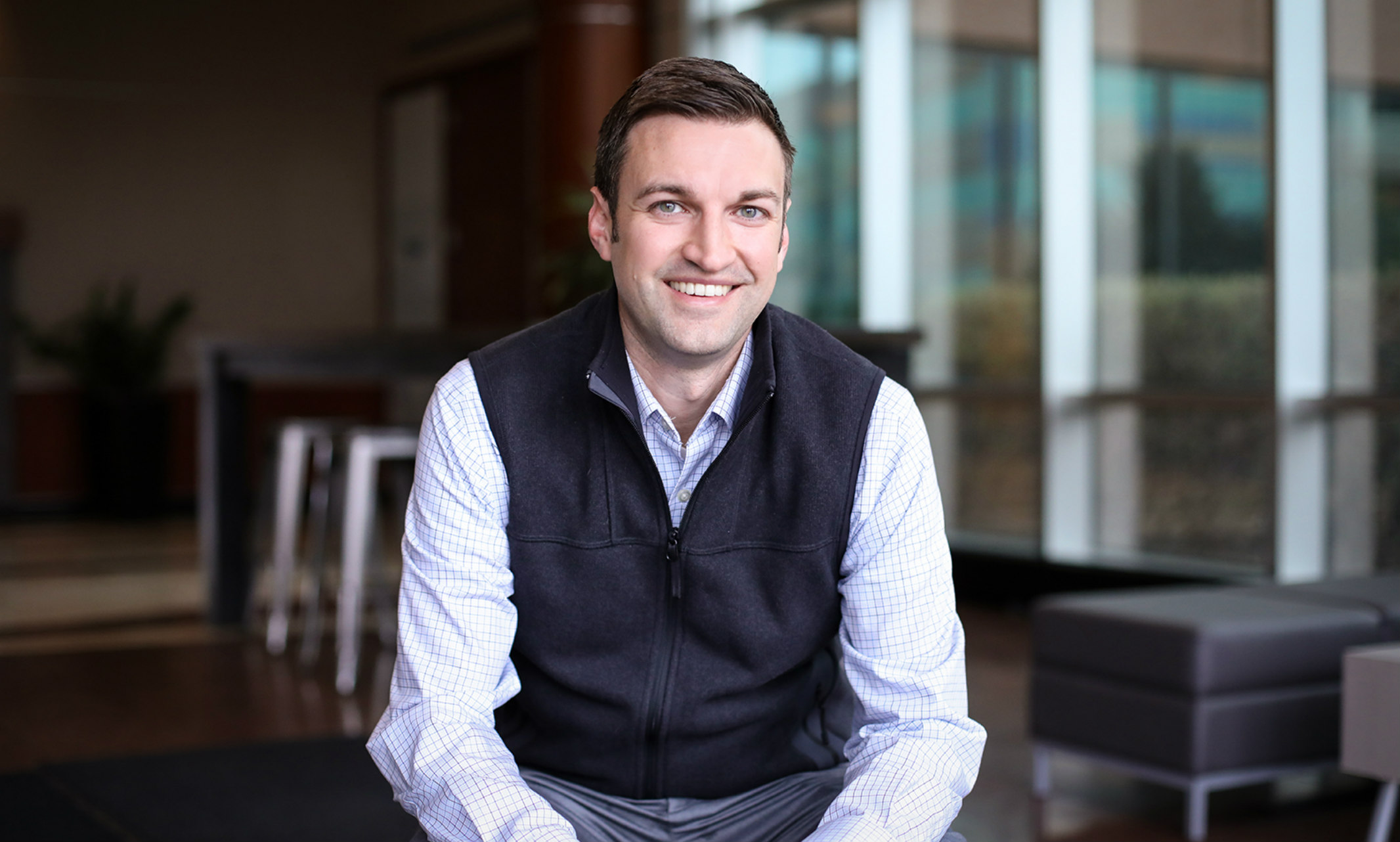
SCE graduate Mark Chrisman shares changes in his field since COVID-19
Our ongoing story starts with people from around the world, converging here at UMKC. Get to know our people and you’ll know what UMKC is all about.
As healthcare practice director and a vice president for Henderson Engineers, Mark Chrisman (B.S.M.E. ’02, M.S. ’07, Ph.D. ’19) works in an already challenging field heavily regulated by codes and standards — he works with teams to design building systems (mechanical, electrical, plumbing, fire protection and technology) for healthcare facilities. Now, with the coronavirus pandemic, his field has undergone a transition to converting existing buildings into healthcare facilities.
How has your work shifted since the onset of COVID-19?
COVID-19 has presented many challenges and opportunities for us. Primarily, we are trying to be as flexible as possible to assist our healthcare clients as their needs change, which is drastically different depending on what part of the country they are located. One day, we are planning for a COVID-19 observation unit and renovating standard patient rooms for negative isolation rooms designed for patients with COVID-19 to prevent spread, and the next day we are continuing work on projects that started design before the COVID-19 pandemic. Luckily, we have many talented engineers, so we’re able to pivot quickly.
What kind of considerations are taken when converting large spaces or centers into places for patients (coronavirus or otherwise)?
The first question on the building system side is what type of patient will be treated in the conversion space — COVID-19, non-COVID-19, and capable of self-preservation or not. Once we understand the patient type and modalities, we can assess the existing building systems and design whatever renovations or upgrades are needed to support the patient functions. Typically, in large event spaces, such as a convention center, there will be a need to upgrade the mechanical system to accommodate additional outside air or exhaust requirements for the applicable patient functions. While most event spaces have emergency power in some shape or form, upgrades likely will be required to support the additional mechanical system work as well as power for any additional life support or technology systems needed.
Why did you choose this career/field?
I got into engineering primarily because I loved building with Legos as a kid and I enjoyed the process of taking things apart and putting them back together. My father and both of my grandfathers were engineers. While they were all more focused on the industrial side of engineering, I went the mechanical route as it allowed several different paths forward, including consulting, manufacturing, and processing. After two internships, I ended up interviewing with a consulting firm (Henderson) and two different types of manufacturers. I chose Henderson because during the interview process the people were really great and I felt like it fit me culturally. Nearly 16 years later, I can say that it was the best decision I’ve ever made, both professionally and personally. It’s an amazing, inspiring place to work with an excellent culture filled with fun, talented colleagues.
You’re a three-time UMKC graduate. What did you most appreciate about UMKC?
I liked being close to home to help my parents and siblings during my undergraduate degree and my wife and children during my graduate degrees. I also really like that it is a beautiful and ever-growing campus tucked inside a great city with some tremendous resources nearby, including the Miller Nichols and Linda Hall libraries. The schedule was flexible enough for me to work through all three degrees without any major issues. Lastly, everyone I encountered during my time at UMKC was always willing and able to assist in whatever way they could to further my education. They also provided support in several ways to help me make industry connections.
"Everyone I encountered during my time at UMKC was always willing and able to assist in whatever way they could to further my education." —Mark Chrisman
Who has been a great influence in your life?
My parents, first and foremost, but also my grandparents, and many friends of my parents. At UMKC, there were several professors who helped guide my path, including Dr. Bryan Becker (now retired) who has been a mentor for many years and served as my advisor on both of my graduate degrees. I have also had several great mentors at Henderson Engineers, including Darrell Stein and Shane Lutz. It really does take a village, and I have found that having a large network has been beneficial in picking up skills and knowledge.
How are you now using your influence to impact others?
I have always had a passion for learning and then passing that knowledge along, which occurs through mentoring at Henderson Engineers and Henderson Building Solutions. My current role has allowed me to expand my reach by sharing technical knowledge and thought leadership so we can help others working in the engineering and healthcare industries.
Apr 29, 2020
UMKC grads use experience to combat the coronavirus
UMKC Roos are lending their expertise across the country to help ease the pressure of the COVID-19 pandemic. These are just a few of the graduates making a difference.
Janelle Sabo (PharmD ’00), a clinical development executive at Eli Lilly and Company, led the development and implementation of a registration, data collection and results reporting system to enable Lilly’s COVID-19 testing efforts, which includes a drive-through testing facility and diagnostic lab. Lilly has collected over 50,000 patient samples from across Indiana focusing on front line healthcare workers, first responders, essential workers and vulnerable patients. Additionally, Sabo has led cross functional teams and actively participated in multiple industry forums addressing the challenges in global clinical research during the COVID-19 pandemic. To learn more about Lilly’s efforts to fight COVID-19, visit Lilly.com.
Alexander Garza (B.S. ’90), oversees hospitals in four states as chief medical officer of SSM Health in St. Louis. He is also incident commander of the St. Louis Metropolitan Pandemic Task Force and appeared on MSNBC in March to discuss the uptick in COVID-19 cases in the Midwest.
Gina Mullen (M.D. ’11), emergency room doctor, physician and medical director at VA North Texas Healthcare System and Baylor Medical Center at Uptown appeared on Anderson Cooper 360 with her husband, Jim Mullen. Gina Mullen was treating coronavirus patients in Dallas, Texas, when Jim — a lawyer with a background in nursing — decided to go help COVID-19 patients in New York.
Mary Anne Jackson (M.D. ’78), dean of the UMKC School of Medicine and infectious disease expert, is one of six physicians statewide advising Missouri Gov. Mike Parson. Her expertise has been cited in numerous programs and publications including Doctor Radio on SIriusXM, KCUR and The Kansas City Star. She also helped gather personal protective equipment across the UMKC Health Sciences District to be donated to area hospitals.
Apr 29, 2020
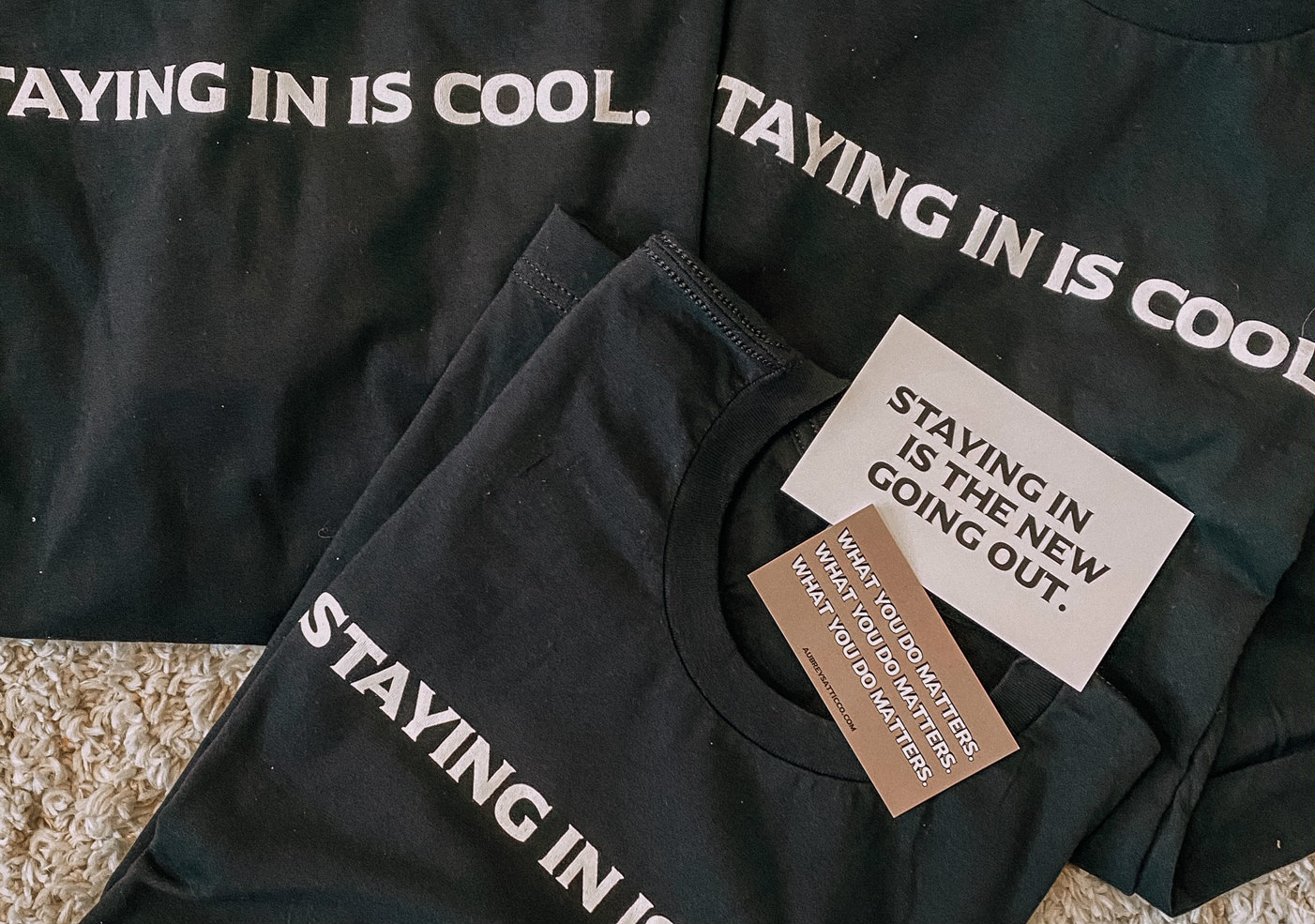
Aubrey Larkin has turned her entrepreneurial efforts to help the UMKC student assistance fund through design and sale of a new T-shirt
Like many UMKC students, Aubrey Larkin is living at home, going to Zoom classes online and hoping and waiting for the COVID-19 crisis to subside. But Larkin, who says she comes from a long line of entrepreneurs, mobilized her online shop, Aubrey’s Attic Company, to create a product that will help students in need.
“I’ve been in business almost my whole life,” Larkin says. “Since I was young, I’ve been selling things - lemonade, cards, art.”
Larkin developed a love for fashion in middle school, and in her senior year of high school, she started a blog featuring products, trends and looks she liked. Her business developed from there.
“My senior year in high school, I decided to turn the blog into a business. I researched wholesalers and turned the site into a store.”
When the coronavirus began to spread, she wanted to be a part of the community that was helping.
“My mom and so many of our friends were making masks,” she said. “I wanted to contribute. I started looking for a way I could help UMKC students. I knew a lot of people who were struggling financially.”
"I wanted to contribute. I started looking for a way I could help UMKC students."- Aubrey Larkin
Her mother discovered the UMKC Student Emergency Relief Fund, and after doing some research, Larkin knew that was the best place to direct her support.
“I have a great platform on Instagram, and I knew I could create awareness for both sides – people who needed the help and people who could donate.”
Larkin designed a black T-shirt with the phrase, “Staying in is cool.” in bold white text. The shirts retail for $34 and all the profit - $14 per shirt – will go directly to the student relief fund.
“I didn’t want to make money off this myself,” she says. “I just want to reach as many people who can buy them – and help students – as I can.”
“I am continually amazed by the creativeness and thoughtfulness of our students, and Aubrey represents that ingenuity,” said Lisa Baronio, president of the UMKC Foundation. “Together, UMKC will survive COVID-19. We are grateful for all of our students. I am looking forward to proudly wearing my own awareness T-shirt that will benefit our students.”
Apr 28, 2020
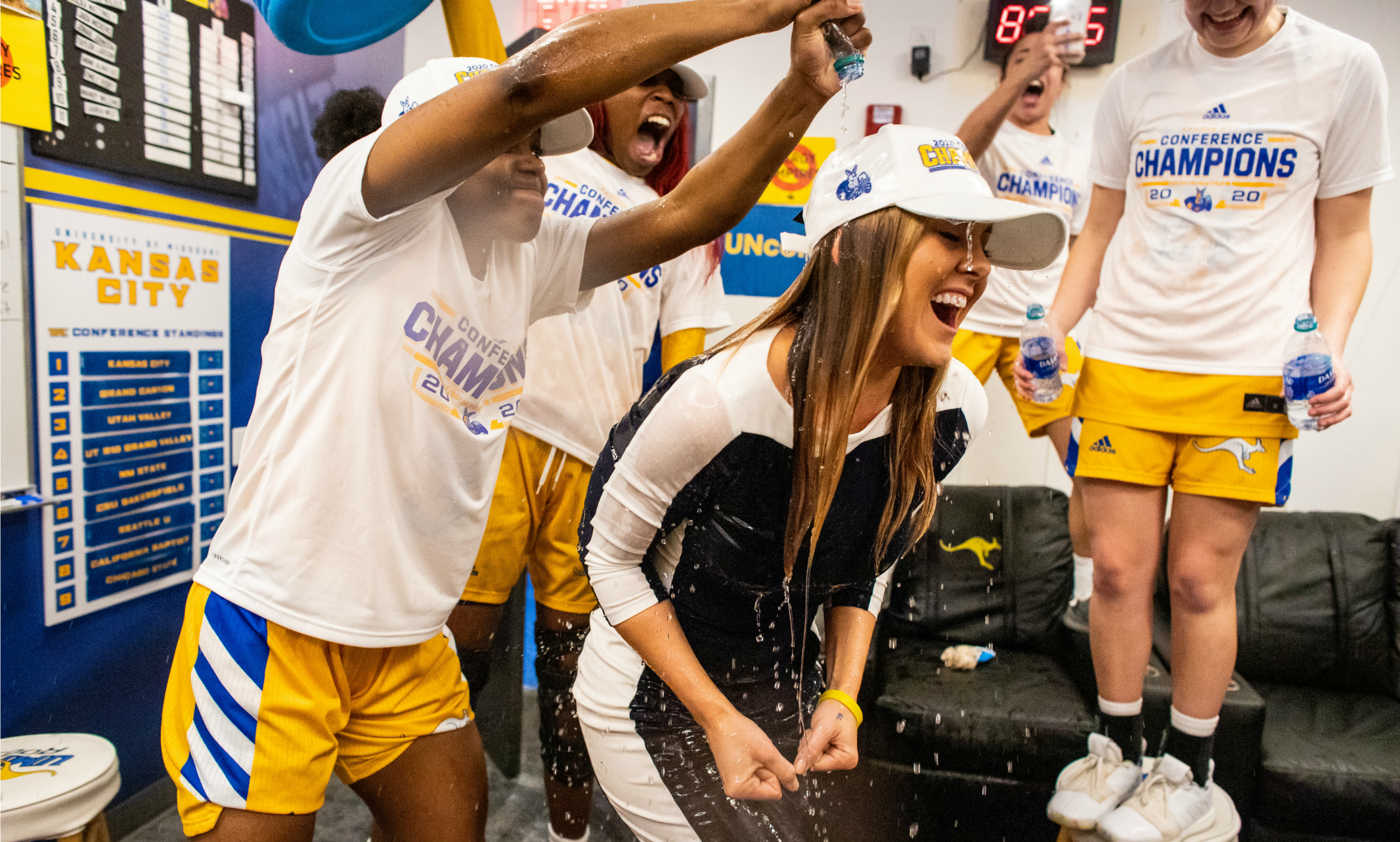
Coach Jacie Hoyt, Ericka Mattingly recap the team’s journey to winning the WAC
Although it’s been nearly seven weeks since the KC Roos women’s basketball team made UMKC history by winning the WAC championship, the celebration and excitement carry on as if it had just happened yesterday.
We caught up with head coach Jacie Hoyt and leading point guard, senior Ericka Mattingly to reflect upon the team’s incredible journey leading up to this major achievement and their hopes for the future.
Hoyt said that at the start of the season, the team knew it wanted to win the conference championship ‑ and the players believed they were capable of doing so, but they also knew they had to take it one day, one game at a time. Last season, the team lost in the semi-finals to New Mexico State, who went on to win the WAC and a spot in the NCAA tournament. With a sour taste in their mouths and unfinished business to handle, the KC Roos used that as motivation all season long, ending the year with a 21-10 record.
“Our team has a motto that never changes – be uncommon. We talk daily about being uncommon in everything we do from basketball to school to being representatives in our community and everything else in our lives. We feel that if we make uncommon choices and decisions each day, they’ll add up to something that separates us from others,” Hoyt said.
“We were always pushing each other to be the best we could be." - Mattingly
It took being uncommon to secure the program's first-ever regular-season conference championship and NCAA Women’s Division I Basketball Tournament berth. Though the NCAA tournament was cancelled due to COVID-19, the team still has plenty to celebrate as the recognitions keep coming in:
WAC Coach of the Year – Jacie Hoyt
WAC Player of the Year – Ericka Mattingly
Spire Sportswoman of the Year – Ericka Mattingly
Back-to-back winning seasons for the first time since 1991 - 1992
“I was ecstatic to learn about being named Sportswoman of the Year by the Kansas City Sports Commission,” Mattingly said. “When Coach Jacie called me to let me know I had been chosen and to tell me who I was going to be in company with, it was an amazing feeling! There are going to be KC Super Bowl champs there. So, I am super excited and grateful receive that award.”
Though much of the season’s success is attributed to Mattingly’s contributions, becoming just the second Roo player to surpass 1,000 points in two years, she and Hoyt say it’s all about teamwork.
“I’ve learned many lessons in my coaching career, one being that it’s incredibly hard to win, and you have to have the right people to get it done,” Hoyt said. “Receiving the Coach of the Year recognition is a true reflection of my staff and my team.”
That same attitude is reflected throughout the entire squad. Hoyt said winning a championship is all about surrounding yourself with the right people. She said the women’s coaching staff works tirelessly at their craft and has the integrity and motives to invest in each player the right way; and they sought to recruit players who are high-achieving, competitive and who value hard work. These things are the ingredients that helped cook up a history-making season in addition to collaborative team effort.
"I believe that we have the respect of the Summit League after what we did this year, and we want to go into the new league and show them what we are all about.” - Hoyt
“I love those girls and would do anything and everything for them,” said Mattingly, adding that she also has a great relationship with Hoyt, who they affectionately call Coach Jacie. “I know that, from my two years, I have developed friendships that will last for years to come.
“The biggest lesson that I will take away from Coach is to always push yourself to be the best you can be. Speak up and be loud and proud in yourself and your goals. Be passionate and always do it with God in your corner!”
Having missed the opportunity to keep going and compete in the NCAA tournament, Hoyt said the disappointment of not being to play due to the coronavirus will be motivation for next year. The third-year head coach, who brought instant success to the KC Roos when she took over in 2017, said she’s not a big goal person, but she believes in doing your absolute best every day and seeing what happens over time.
“Nobody knows when this COVID stuff will clear up, and we certainly don’t know what it looks like when it does,” Hoyt said. “I just want to say that our team came out victors, not victims of the circumstances. I believe that we have the respect of the Summit League after what we did this year, and we want to go into the new league and show them what we are all about.”
As Mattingly prepares for virtual commencement and closes out her collegiate journey with a degree in criminal justice and criminology, she is excited to pursue a career in coaching.
“I have always been passionate about helping others, and especially helping young women be able to have successful careers, get better on the court and get better off the court as well,” Mattingly said. “Having an influence in changing their lives like my coaches have done for me.”
As for her teammates and the newcomers joining the team next year, she advises them to always stay hungry.
“Push yourself to be the best you can and make sure that you are embracing the present,” Mattingly said. “I know things get hard, and being a student-athlete is not easy, but appreciate it while you can. There is so much to be grateful for!”
Recap the season
Apr 28, 2020
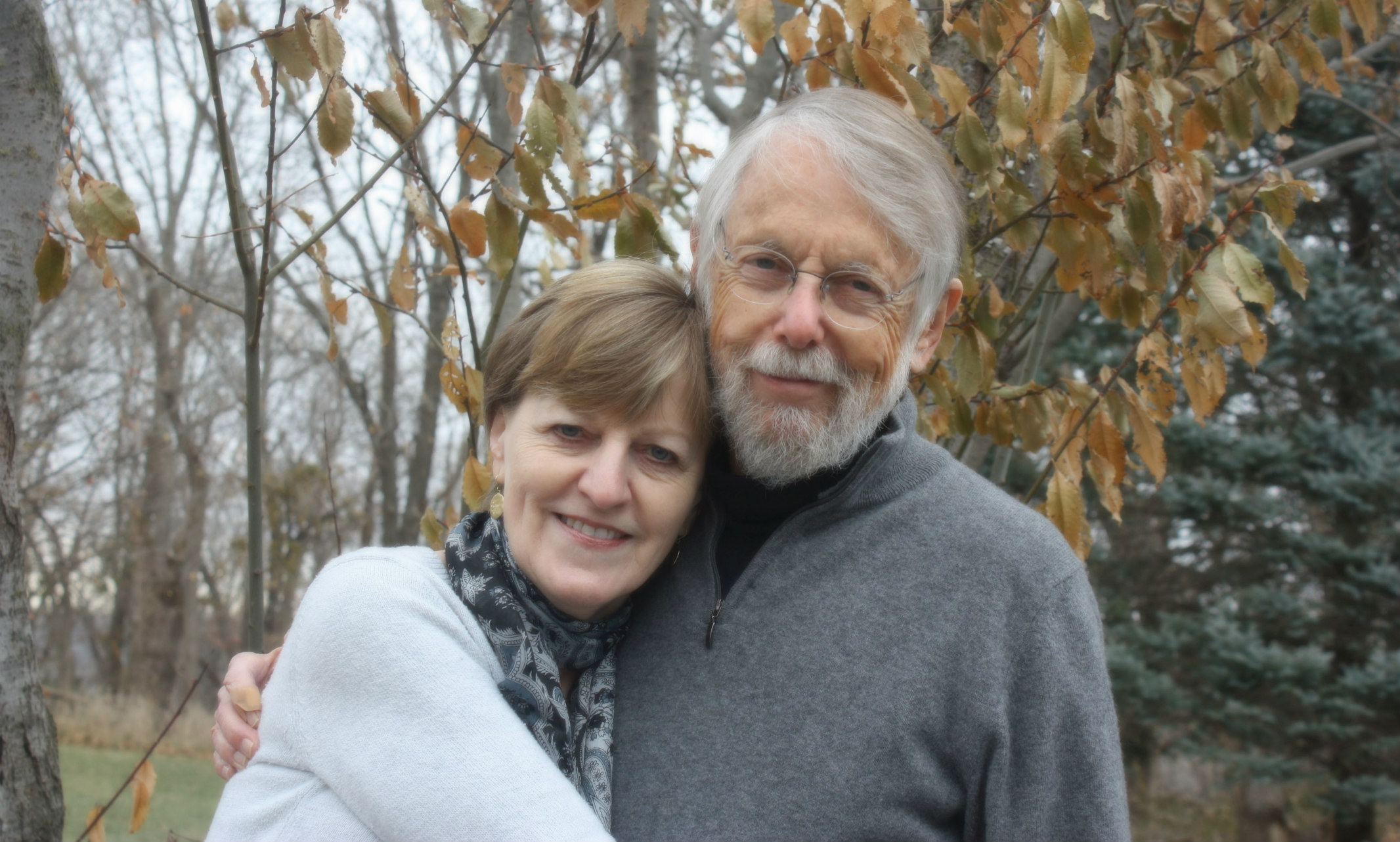
The late Gordon Spencer was a disc jockey and enthusiastic collector who interviewed jazz greats and other musicians and composers.
Gordon Spencer interviewed many of the remarkable jazz artists of the 20th century including Billie Holiday, Duke Ellington and Louis Armstrong. He began his career in radio in 1951 at WSRN, the student radio station at Swarthmore College in Pennsylvania when he was a junior. His widow, Hannelore Rogers, has donated his extensive collection of albums, CDs and his reel-to-reel interview tapes to the Marr Sound Archives so enthusiasts and scholars can benefit from his remarkable career.
“Gordon loved jazz beyond anything else,” Rogers says. “He had two passions – radio and stage. As a little boy, his aunt gave him a pretend radio play set with scripts, a wooden microphone and sound effects equipment.”
This childhood gift led to a lifelong career. Spencer worked at radio stations along the East Coast starting when he was in college. Rogers met Spencer when they were both living in New York in the early 1980s.
“I listened to WNCN in the morning. There was this DJ, Gordon Spencer, and he was very funny and could pronounce all of the composers’ names. I wrote him a letter and said, ‘If you’re not married or the father of 10 children, call me.’”
Spencer did call, and took her to lunch at an Indian restaurant for their blind date. It lasted four-and-a-half hours.
He told her later, “classical music DJs don’t get a lot of fan mail.”
“When he was at WNCN in New York, he started buying records to play on the air,” she remembers. “Once he had his own program, he would go to the public library to check out albums to play on his show. His passion was incredible. There was no limit to what he was willing to do.”
“Gordon loved jazz beyond anything else.” - Hannelore Rogers
Spencer’s collection includes 2,550 albums, 1,215 CDs and 165 reel-to-reel and cassette tapes of his interviews with musicians. While Rogers understood the significance of his work, it took her a while to find a home for the collection.
“After he died, I had to deal with his belongings. Clothes were easy to donate. But his office and his albums and tapes were in the basement. He spent a lot of time there and it was too painful for a long time for me to walk in.”
Eventually, she became concerned that if something happened to her, the collection might disappear.
“I was worried it would end up in a landfill or garage sale,” Rogers says. “I started asking around and someone referred me to Chuck Haddix at UMKC. When I spoke to him the first thing he told me was, ‘Whatever you do, don’t break up the collection.’”
Haddix, curator of the Marr Sound Archives, notes that the entire collection is impressive, but believes the interviews are the most exciting.
“Spencer interviewed an unbelievable amount of jazz greats as well as contemporary classical composers,” Haddix said. “A lot of the classical composers were very Avant-garde. Some were from Europe. Usually someone will have a very narrow focus, but Spencer’s interest was broad. He was also a radio producer, so the quality of his interviews is outstanding. They’re really great quality.”
Beyond technical quality, Spencer was a great interviewer.
“He really let people tell their stories,” Haddix says.
Haddix, who is also a radio producer and accomplished interviewer, thinks his understanding of the material and Spencer’s process may have helped Rogers.
“Donors have an emotional connection,” Haddix said. “Just as with Hannelore, it’s usually their partner’s life’s work and they want to do the right thing and memorialize their loved one. Now the collection will live forever.”
Haddix appreciates Spencer’s talent, taste and painstaking care of his collection. He says that it’s not unusual to develop a personal connection to the collector.
“Every collection tells a story. They’re all different. He was meticulous. Everything was very carefully selected. This collection represents his life’s work. As the recipient of the collection, you get to know them after the fact. Often I think, ‘I’d love to have met him.’”
Haddix and his team have begun preserving the collection. They are currently digitizing the open reels and creating a collection page with a search option. Once everything is catalogued and digitized, the collection will be searchable on the internet.
“Every collection tells a story. They’re all different. I’d love to have met him.” - Chuck Haddix
Haddix’s connection to the collection has made the donation process easier for Rogers.
“I have found UMKC to be so sensitive about what this meant to me,” Rogers says. “Gordon’s collection was something I had to let go. But when Chuck came and loaded the truck with all the materials, I knew UMKC would take excellent care of it.”
Apr 28, 2020
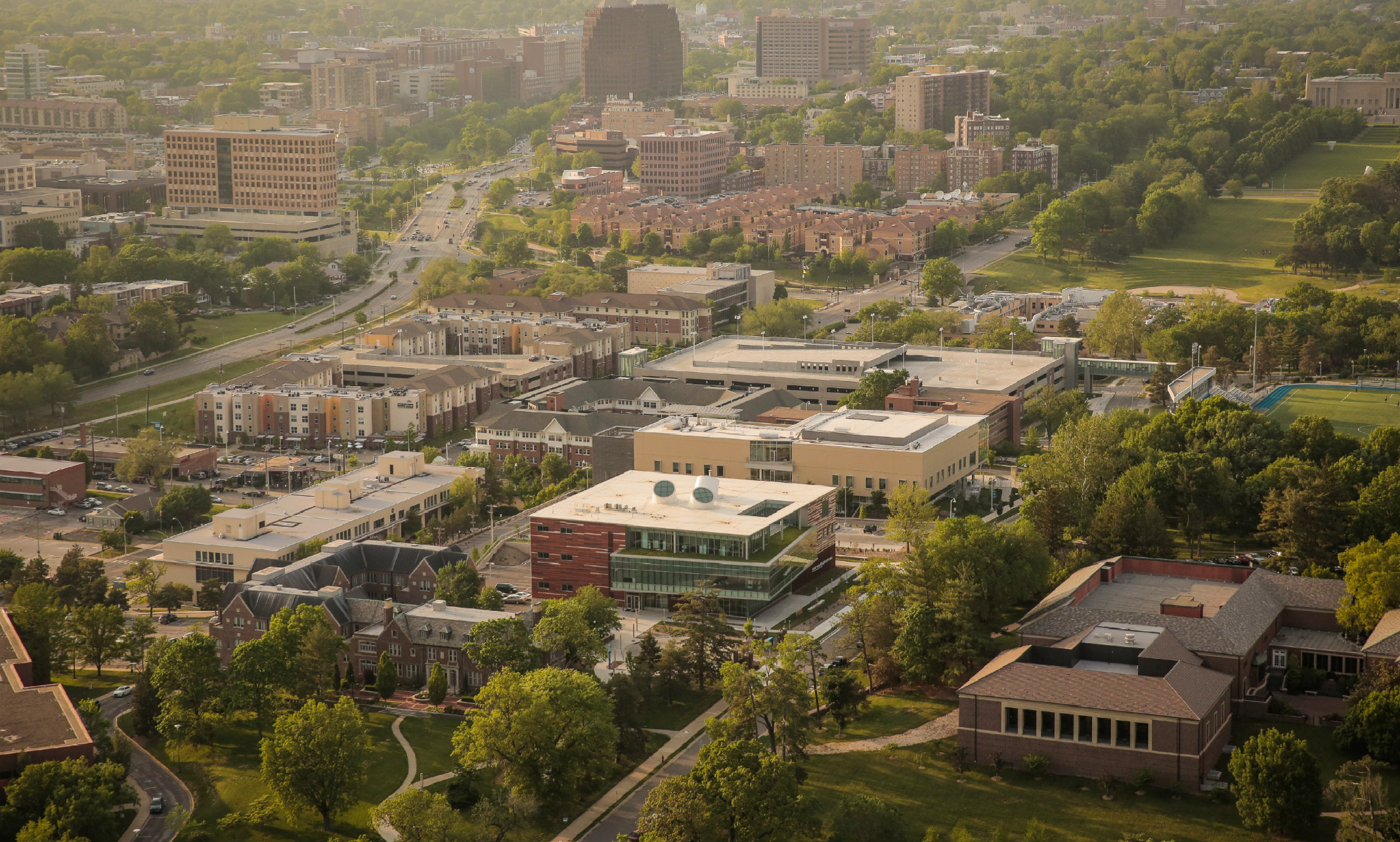
Welcome Provost Lundgren and School of Medicine Dean Jackson
University of Missouri-Kansas City Chancellor Mauli Agrawal announced appointments to two key leadership positions at the university.
Jenny Lundgren, Ph.D., will serve as provost and executive vice chancellor, the chief academic officer of the university. Mary Anne Jackson, M.D., will serve as dean of the UMKC School of Medicine, known around the world for its innovative six-year B.A./M.D. program. Both have been serving in those roles on an interim basis; “interim” will be dropped from their titles May 1.
Typically, even when they have strong internal candidates, major research universities conduct a national search for senior leadership positions. The unprecedented impact of COVID-19 demanded a change in approach.
“In this challenging time, I must balance that tradition against the immediate need for stable, innovative leadership,” Agrawal said in a letter to campus April 28. “Drs. Lundgren and Jackson have led with intellect and heart during the pandemic, and I have full confidence that they will continue to capably help us navigate through the uncharted territory ahead.”
During her first three months in the provost role, Lundgren has demonstrated a deep capacity for working through complex issues with partners across UMKC and the University of Missouri System.
She also will continue to serve as dean of the School of Graduate Studies until further notice. Prior to these roles, Lundgren was a well-published researcher who served as a department chair of Psychology and as an associate dean in the College of Arts and Sciences. She joined UMKC in 2006.
“I appreciate greatly the trust and confidence Chancellor Agrawal has placed in me, and I will do my best to live up to it,” Lundgren said. “I am equally grateful for the guidance, support and wisdom my faculty colleagues have shared with me over the past several months, and hope to continue to be able to rely on such a valuable and rewarding collaboration.”
Jackson has been leading the School of Medicine for almost two years. She is an alumna of the UMKC School of Medicine and a pediatric infectious diseases expert, affiliated with Children’s Mercy and internationally known for her research. During the current COVID-19 crisis, she is one of the six physicians statewide who is advising Missouri Governor Mike Parson. She is a frequently sourced expert for national publications. She joined UMKC in 1984.
“I am honored to serve as the dean for this medical school, which has been ahead of the curve in educating and mentoring physicians and health professionals for nearly half a century,” Jackson said. “I look forward to helping grow its research enterprise to improve the health of our community and beyond.”
Agrawal said he is postponing indefinitely plans to create a senior leadership position to oversee the deans of Medicine, Pharmacy, Nursing and Health Sciences, and Dentistry on the Health Sciences Campus at Hospital Hill. He will review that idea once the university has moved past the challenges of the pandemic.
“I extend my heartfelt thanks to these two leaders for their contributions to UMKC as we continue to pursue our mission of excellence in learning, service and discovery,” Agrawal said.
Apr 28, 2020
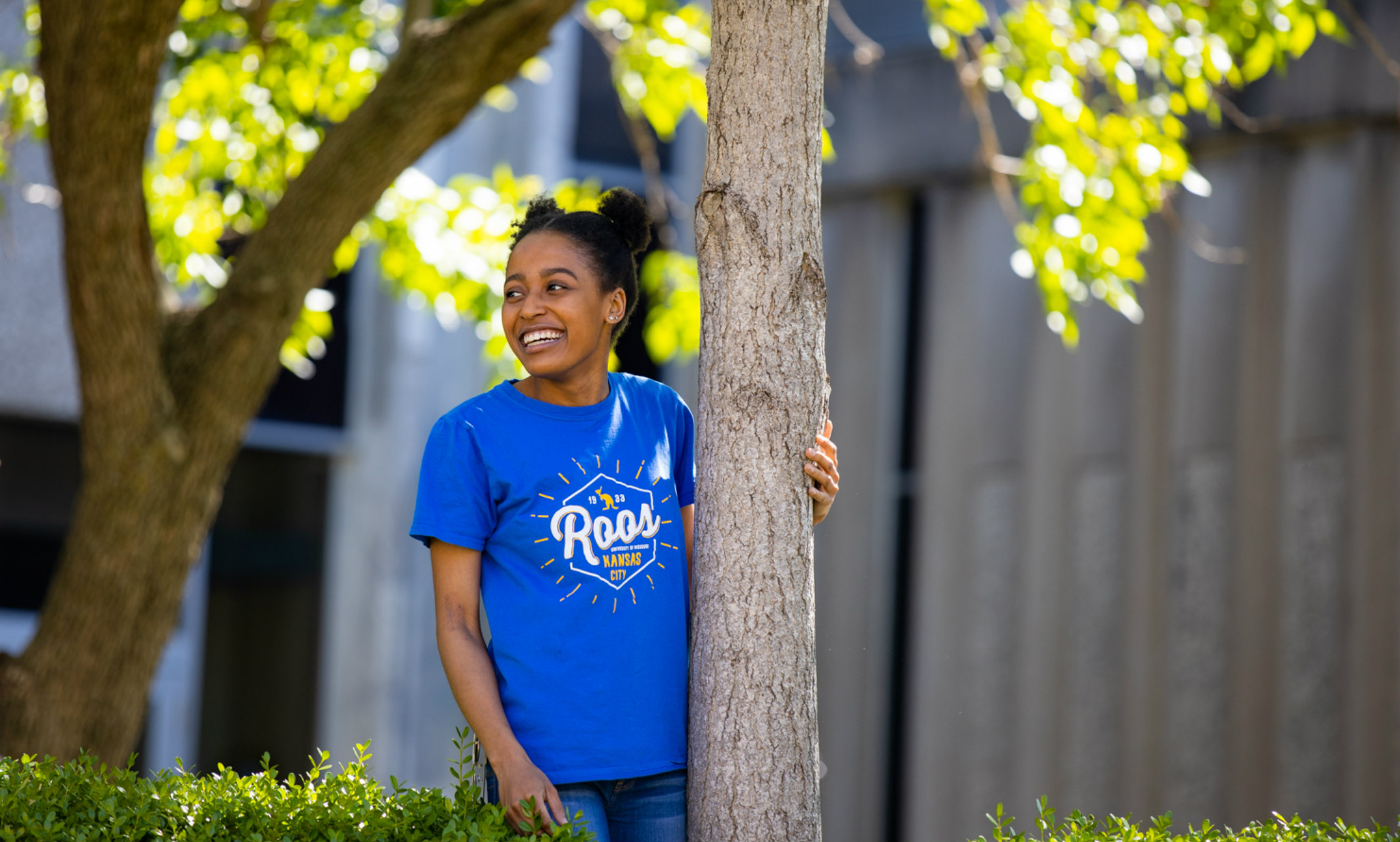
UMKC courses will start on schedule whether they’re in person, online or a mix
UMKC faculty and staff are preparing for any and all eventualities to start fall semester classes on schedule, under any conditions ranging from full remote to wide-open campus, and anything in between.
Make no mistake: Your university is #RooReady ready to launch an exciting and meaningful fall semester in August, no matter what conditions the world may throw at us.
“We anticipate being back on campus for face-to-face courses and the full UMKC campus experience in the fall,” said Jenny Lundgren, provost and executive vice chancellor. “We are mindful, however, that public health officials are recommending that we be ready for multiple scenarios. Because the health and safety of our campus community is our top priority, these may range from a stay-at-home order requiring all-online instruction, to a return to a fully wide-open campus or something in-between.”
The university will follow the recommendations of health officials and obey state and local laws.
“We may need to move in and out of these strategies through the academic year based on regional disease patterns,” Lundgren said.
Given these varied possibilities, the university’s approach has been to increase online offerings to maximize flexibility in course schedules. The faculty have increased the number of courses that will be taught with a mixture of face-to-face and online elements.
“We anticipate being back on campus for face-to-face courses and the full UMKC campus experience in the fall.”
“We love interacting with students in person and miss the physical presence of our campus community, but everyone at UMKC will follow the guidance of public health and government officials and adapt as needed throughout the semester,” Lundgren said. “Faculty are working diligently this spring and summer to design and re-design their courses with best practices for both face-to-face and online delivery.”
Lundgren said university officials know that students are facing special challenges because of the pandemic.
“We recognize that many students struggle to have the resources they need even in the best of circumstances,” she said. “Thanks to the generosity of many donors, we have set up an emergency fund to help students meet basic needs that affect their ability to engage and learn. We also have an online A-Z resource guide to assist them now and in future semesters.”
How we're preparing campus for fall
Learn more about how COVID-19 is affecting fall semester class scheduling.
Read about campus living and dining changes this fall.
Learn about the university's new cleaning practices for campus.
See the new personal protective equipment vending machines that will be on campus.
Check out the shields and physical distancing measures for classrooms and offices.
Apr 28, 2020
UMKC's Aubrey Larkin is helping her fellow students during the COVID-19 pandemic
KSHB reports how UMKC Student Aubrey Larkin is donating proceeds from the sale of T-shirts to the UMKC Emergency Student Relief Fund to help those struggling during the COVID-19 pandemic.
Apr 28, 2020
UMKC teachers take part in program to help fund private music lessons
KCUR spoke with Eman Chalshotori, one of 15 teachers in UMKC Musical Bridges, a program that helps fund private lessons for some 60 music students in the area school districts.
Apr 24, 2020
UMKC working with local governments on a Draft Model Data Handling Policy
Kansas City, in collaboration with the University of Missouri and other local governments, has created a model to tackle the policies and procedures needed to manage sensitive data in communities as tech use grows. Read the story in Government Technology
Apr 23, 2020
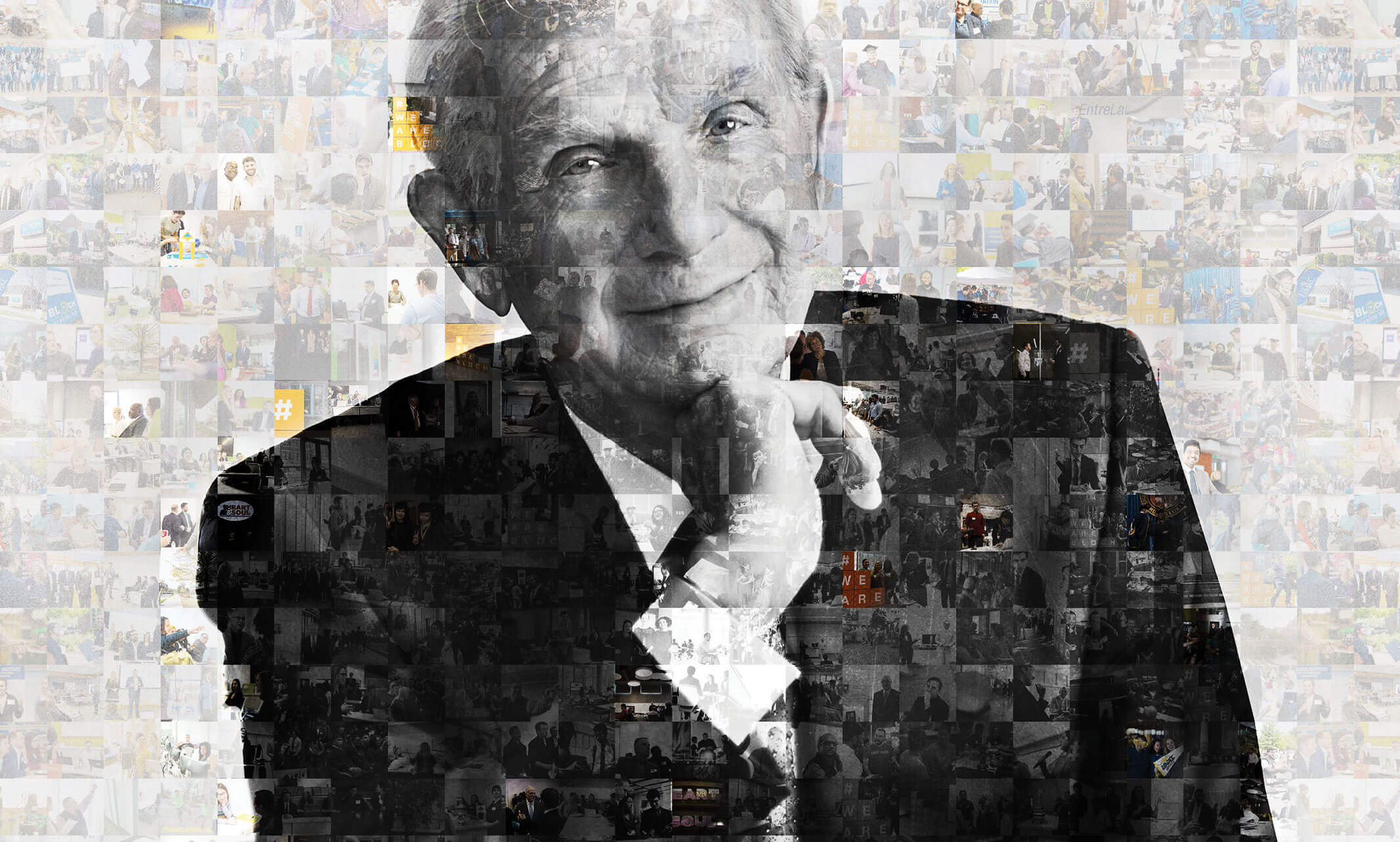
We remember Henry W. Bloch, whose all-in approach, gratitude for community and love of people set the foundation and future for the Bloch School of...
Henry W. Bloch knew how to leave an impression.
Brian Klaas, Ph.D., Bloch School dean, remembers vividly how gracious and kind Mr. Bloch was, even when he was emphatically making a point.
“Henry and I were having a wonderful conversation about H&R Block, Kansas City and the Bloch School,” Klaas recalled. “Mr. Bloch paused, leaned in and said, ‘We need to help the Bloch School achieve excellence, and we need to do it quickly. We need to do it for Kansas City because this city needs a great business school. Are you going to be a part of this?’”
The quest for excellence long guided Henry. He was an investor and he expected a return of excellence. The Bloch School was his investment, forged as a freshman at UMKC, then called the University of Kansas City.
Through good times and bad, achievements and struggles, Henry was all-in with Kansas City’s business school. Up to the end of his life, Henry was working on making the Bloch School excellent.
That was his mission.
That is his legacy.
“When I look around Kansas City and look at all the places where Henry has made his mark, I think one of the most incredible places is the Bloch School,” said Jeff Jones, president and CEO of H&R Block. “When I think about legacy and future, the idea that his name will continue to spawn the next generation of entrepreneurs that will go on to have success in Kansas City and beyond is one of the most incredible representations of what legacy can be about.”
How this legacy began and how this legacy lives on in others is a testament to his values that will endure long into the future.
A kid from down the block
When Henry died on April 23, 2019, at the age of 96, he left behind a well-documented life. He was many things: entrepreneur, executive, philanthropist, husband, father, avid fan of the Royals and Chiefs.
He also was a study of contrasts. He was someone who repeatedly said he wasn’t very intelligent but demonstrated he was extraordinarily intelligent, shrewd and insightful. He was a humble young man who went on to become a war hero. He was someone who claimed his success was simply luck but also worked very hard, developed sound business strategies and executed them in a masterful way.
And he was someone educated at the top universities in the country who purposely invested his time and resources over the course of decades to the business school of the local university he only attended for one year.
“He was a pretty interesting individual. All these things were opposites but he bridged them together,” said UMKC Chancellor C. Mauli Agrawal, Ph.D. “That was perhaps the source of what distinguished and differentiated him as a person and made him stand out.”
Henry grew up at 58th and Wornall and went to Southwest High School. When he came to what was then the University of Kansas City, both Bloch and the university were young. Henry graduated early from high school and was unsure of his direction and his abilities.
“This was his first real effort at becoming a grownup,” said John Herron, Ph.D., interim dean of the UMKC College of Arts and Sciences.
At UMKC, Henry discovered a passion for mathematics and the first signs of it being a possible career. While his academic skills grew at the University of Michigan and his short time at Harvard Business School, it started here.
UMKC, starting a few years before Henry’s arrival in 1933, was part of Kansas City transitioning from its cowtown image into what would become a booming metropolitan area. While the university offered business classes, it would be quite some time before a bona fide business school would spring up.
Herron recalled asking Henry about moving away from Kansas City or giving to other places outside the region.
“Henry was incredulous at the question. ‘Why would I have done that? Kansas City gave me everything,’” Herron said.
Herron thinks that comes from Henry’s perception that he and H&R Block really couldn’t have made it anywhere else. Unique conditions allowed the business to grow: postWorld War II economic booms, the Internal Revenue Service halting its free tax preparation service and a growing metropolitan area in Kansas City.
But Henry was cognizant of the cultural sensitivities of Kansas City. After all, Henry and Richard Bloch were two Jewish brothers who walked down Troost Avenue and Main Street, talking with African-American businesses about helping with their bookkeeping needs.
Even though Henry spent one year at what was then the University of Kansas City, he maintained a decades-long relationship with UMKC and what became the Henry W. Bloch School of Management. Photo courtesy of H&R Block.
Henry’s service during World War II amplified that contrast of modesty and doubt and achieving success through hard work. Herron and Mary Ann Wynkoop, a retired UMKC professor and former director of the American Studies Program, co-wrote “Navigating a Life: Henry in World War II,” which chronicles Henry’s days in the U.S. Army Air Corps.
For all the adventures and accomplishments, this stood out to the two authors: Henry was someone who noted the taxing nature of navigator training and wondered if he could complete it, but ended up completing 32 missions without a single injury to himself or his crew. He was a war hero but he would never admit it.
Henry, in conversations with Herron for the book, would say his successes, like so many things in his life, were the product of luck. But other values were taking root, like hard work, discipline and, because of the war, losing his fear of failure. And perhaps most important, being faithful to where you came from.
Herron said UKC was a critical time in Henry’s life, one that he looked back on with fondness.
“He was trying to figure out what are the proper boundaries of adulthood, and it all came together for him here,” Herron said. “He felt a great connection to the place.”
And that connection would be the foundation to build upon the small business school at UMKC.
Going all in
While Henry and Richard were building H&R Block, the university was struggling to get its business school going.
According to Chris Wolff, who researches UMKC history, the school of business started on a shoestring budget and a desire for business classes.
The school didn’t have its own facility until the university bought the Shields Mansion. But the school quickly grew and was soon competing with its neighbor, Rockhurst University, for top business students.
In 1983, Dean Eleanor Schwartz, who later became UMKC chancellor, convened an advisory committee of local CEOs to help the school meet the needs of area employers and achieve accreditation from the Association to Advance Collegiate Schools of Business, the premer accreditation body for business schools.
The mansion was in dire need of renovations. With project plans totaling $7.5 million, the University of Missouri System allocated $6 million toward the renovation. The rest was to be left to private donations.
By this point, the Bloch family had already funded the Leon Bloch Law Library for the School of Law in 1978. Seeing a way to help, Henry gave $1 million toward the school.
It led to an intriguing offer.
“(Former UMKC Chancellor) George Russell and (former UMKC Trustee) Ed Smith cooked up the idea of naming the business school after me,” Henry said in spring 2002. “The first I knew about it was at a board meeting. I was very flattered.”
“Henry saw his involvement with UMKC as a way to combine his love for Kansas City and his passion for business,” said David Miles, president of the Marion and Henry Bloch Family Foundation.
"With his namesake on the building, Henry saw an opportunity. He recognized a need within the region for a high quality and respected school of management that would create the next generation of entrepreneurs and business leaders, which he saw as an exciting and worthwhile goal,” Miles said.
Those who knew Henry know that once he was committed, he was committed for life and in all things.
“It struck me that with Henry, there wasn’t a half in. You were all-in or you weren’t,” Klaas said. “Once he made that commitment, he was not going to waver. He was going to be focused on the mission.”
Thanks to Henry’s investment, the Bloch Executive Hall of Entrepreneurship and Innovation opened in 2013.
“A tapestry that works”
When Henry was a student, the term “entrepreneurship education” did not exist. There was no formal educational component to learn the ins and outs of entrepreneurship. The only instructors were the hard knocks of life and business.
When the opportunity came to shape the future of the Bloch School, Henry wanted to make sure teaching the principles of entrepreneurship was top of mind.
Anne St. Peter, who founded Global Prairie, a global marketing consultancy, said that Henry was fond of telling entrepreneurs not to fear making mistakes, as he and his brother made many of them.
“The goal, Henry said, was to learn from these mistakes and to develop resilience along the way,” she said. “Henry told me his support of the Bloch School was to help entrepreneurs learn from the mistakes he and other business leaders made and, hopefully, allow Bloch students to learn valuable business and life lessons quickly.”
Henry’s lessons on entrepreneurship inspired many like St. Peter. Both she and Henry were past chairs of the board of the Kansas City Chamber of Commerce. At a luncheon, Henry told St. Peter to relish the opportunity to serve the business community of Kansas City.
“At the time, I was the youngest leader to serve as Chamber chair, and Henry knew I had two small children,” St. Peter said. “Henry told me to share what I was learning at work and at the Chamber with our children, as he had done with his children while they were growing up. Henry encouraged me to bring our children along for the ride and make them feel a part of my entrepreneurial journey.”
St. Peter admired Henry and his leadership greatly. He served as inspiration for her to certify Global Prairie as a Benefit Corporation, or B Corp. For Henry, community engagement and employee happiness mattered as much as shareholder value.
Another component of entrepreneur education was having a strong physical presence in the community in which you serve. For the Bloch School, that meant state-of-the-art academic and research facilities. In 2011, the school was ready for a substantial upgrade. Just as in 1983, Henry chose to invest, putting $32 million toward a new building.
“I choose to make this significant gift because I felt now was the right time,” he said at a celebratory event on Sept. 15, 2011. “The new mission and vision of the school both respect and directly tie into the legacy of Kansas City and align with what this community wants and needs from its business school.”
Leo Morton, who was UMKC chancellor at the time, said Henry was the right person to do this because he understood that to build a reputation of excellence, you have to have the infrastructure to back it up.
“One advantage UMKC has is its location. If you’re a student who has lots of options and are world class, you can go any place you want to go,” Morton said. “To recruit and retain these students, you need to have faculty that they’re attracted to, and you have to have facilities that match all of that. It’s a consistent picture, a tapestry that works.”
A first-generation investor
Within the timeline of UMKC benefactors, Henry falls in line with the likes of Stanley Durwood, Miller Nichols and Helen Spencer, who built upon the foundation of UMKC. Wolff said Henry’s contribution helped steer UMKC toward the modern era of education.
“Mr. Bloch grew up in an age where it was possible to invent an industry from scratch. He saw that the future of business lay in innovations such as the ones that were created at H&R Block,” Wolff said. “Now that we live in the digital age where once again businesses and entire industries can be invented out of whole cloth, the Bloch School is on firm footing to train the next generation of business leaders and entrepreneurs in this new world.”
Henry was a philanthropist who gave generously. And yet, he was an investor at heart. Morton, who knew Henry for many years before he became UMKC chancellor in 2007, said Henry invested with a sense of purpose, and he wanted a return. When it came to UMKC, he was a first-generation investor.
When investors like Henry invest, “they don’t just put it in and leave you, they put in and hold you accountable,” Morton said. “The investor says, ‘I had an objective when I invested in you and that objective is important to me and I put in enough to show that I’m serious about that investment. And I’m going to hold you accountable.’”
That objective, for the Bloch School, was for it to be excellent. And that’s something Klaas said continues today through the Bloch Family Foundation.
“What the Bloch Family Foundation wants is what Henry wanted: It’s for the Bloch School to help this region thrive. They want us to support the region by pursuing excellence in everything we do and by offering outstanding experiences for students from all backgrounds and at all stages of their careers,” he said.
The values Marion and Henry Bloch set with their life and example continue on in the lives of others who come through the Bloch School and UMKC. Photo by Brandon Parigo.
“Never despise small beginnings”
Henry Wash never had any desire to go into business.
One of the first members of the Henry W. Bloch Scholars program in 2001, he didn’t know much about the scholarship or the man for whom it was named.
He went to the scholarship reception fully intending to drop out of the program.
Then he met Henry Bloch.
“I arrived 30 minutes early and my plan was to get out of it. Mr. Bloch was there when I walked in, just standing,” Wash recalled.
Henry Bloch was early as well. After pleasantries and realizing they had the same first name and middle initial, Wash shared his hesitations.
“I wanted to let Henry know that I’m wanting to get out of this,” Wash continued. “I just wanted to help people. So, I was telling this long story. He was looking at me and when I was done, he said ‘I want to help you. I want to mentor you and help you along.’”
“I was thinking to myself, nah, he wouldn’t want to do that, not for a guy like me,” Wash continued. “And he said, ‘Oh, I really do.’”
That started a long friendship and mentorship that lasted many years. The Henrys spent many a lunch talking about business and life. Henry Bloch visited the Wash family often and sat on the front row during Wash’s wedding.
“I was taught to never despise small beginnings,” Wash said.
Henry knew that investment was more than just funding. It’s about people: where they came from, what they’re about.
“Every time there were students, he wanted to mingle and speak,” Agrawal said. “He was not supporting the Bloch School for the publicity. It’s because he really cared about the students, and that stood out clearly.”
The Henry W. Bloch Scholars program at UMKC, of which Wash did stay in and graduated from in 2003, is now a 20-year commitment to provide those highly qualified students a path toward a degree. It helped students like Marla Howard, who completed her degree in Fall 2005.
She said in 2006 that, “my family hasn’t had a lot of opportunities and isn’t as financially stable as others. So, I was determined to take advantage of any opportunities that crossed my path.”
Wash and Howard are just two of the many students who have been impacted by Henry and the Bloch family’s investments. With the Henry W. Bloch Scholars and the Marion H. Bloch Scholars programs, both high potential and excelling students living in underserved communities attend UMKC on scholarship.
Many students are currently being supported by the Bloch Launchpad program, which combines academic rigor with professional development training.
It’s an investment for success with the goal of – taken from Tom Bloch’s biography of his father – many happy returns.
We are Bloch
To be sure, there is only one Henry Bloch. He is irreplaceable. But his values and the relationships he’s built with UMKC and the Bloch School are the road map for others to make an impact as he did.
“Henry was an amazing example for how supporting a school can make an important difference in the lives of so many,” Klaas said. “We are fortunate to have a number of supporters who were inspired by Henry’s work with our school. And we look forward to building upon Henry’s legacy by engaging with other alumni and supporters who are inspired by our mission.”
The impact is fundamentally relational: Bloch alumni who mentor students, build a company or entrepreneurial venture and fulfill their own debt to Kansas City and beyond.
They carry on Henry’s legacy.
Although Henry came from another generation, what is timeless and relevant are his values: working hard, persevering, learning from customers, serving, giving back generously and never forgetting where you came from.
Agrawal sees Henry’s life and example as imperative to building on that legacy of excellence.
“We are good, but we need to be excellent,” Agrawal said. “So that a student in 2042, when they come to the school, somebody will be asking them where they want to apply and they’ll say, ‘I want to apply to the one of the best. I’m applying to Bloch.’”
This story originally appeared in the 2020 issue of Bloch, the magazine for the Henry W. Bloch School of Management.
Apr 22, 2020
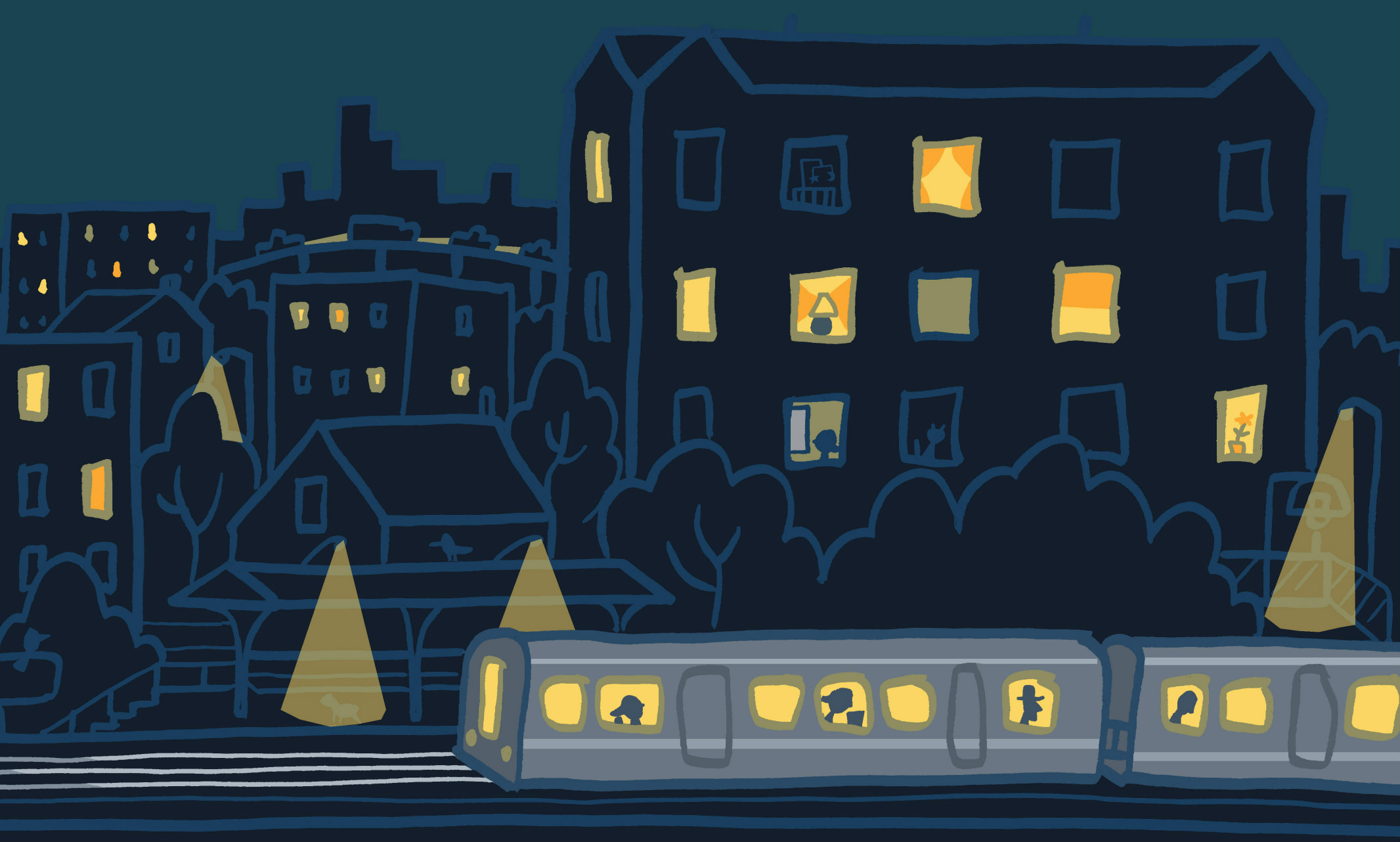
Dentistry graduate Grant Snider discovers his gift for smiles
When most people are just waking up for work, Grant Snider (D.D.S. ’11) is sitting down at his drawing table to make himself laugh with one of his signature comic strips. The rest of his typical work day is spent straightening smiles at his orthodontics practice in Wichita, Kansas.
Grant Snider, D.D.S. '11Credit: Mark Woolcott
About 10 years ago, just as Snider was accepted to the UMKC School of Dentistry, he also embarked on another career, illustrating comics. His multi-panel comics have appeared in the New York Times Book Review, the Kansas City Star, the Best American Comics 2013 and University News, the student newspaper at UMKC. A collection of his comics, The Shape of Ideas, published in 2017, was translated to French.
Every morning at 5:30 or 6 a.m., Snider works on one of his comics for either his blog or social media.
“I always knew I was into science and math,” Snider says, “but I also knew I had a creative side that I wanted to nurture as well.”
From dental school doodles to big-time artist
When Snider was first searching for a creative outlet, he considered watercolor painting or another form of traditional art. Eventually, though, he realized that what he most enjoyed was reading comic strips like Calvin and Hobbes and The Far Side.
The real revelation happened when he came across New Yorker cartoons, with their simplicity of design and quirky observations of life. Initially, he was turned off by them because they were such a departure from the newspaper comics he had grown up with. But as he spent more time with them, it suddenly clicked — this was what he wanted to do creatively.
“I always knew I was into science and math, but I also knew I had a creative side that I wanted to nurture as well.”—Grant Snider, artist and orthodontist
Snider started to use cartooning as a way to relax after dental school classes. He began carrying a sketchbook everywhere he went, doodling anything that inspired him. Over a week or two, those small doodles would become a finished comic, delivering smiles to his close friends and family.
Fast forward several years and his charming, minimalist cartoons are being featured in the publication he once admired, the New Yorker, making people smile around the world.
As Snider puts it, he started drawing before he knew what he was doing, and soon, it was too late to stop — not that he’d want to.
A new source of inspiration
When he and his wife had their first child in 2012, Snider, like many first-time parents, thought “Hey, I should write a children’s book.” The process, though, proved more arduous than he initially anticipated. With a number of ideas going nowhere, he was beginning to doubt the plan.
Then he found out he was chosen for an artistic residency in the Catskill Mountains of New York. He thought this would be the perfect opportunity to work on his children’s book idea. So in April 2018, Snider spent a week in a cabin with three feet of snow on the ground, a trip he calls “the most creatively frustrated period of my life.”
Snider uses his comic to lift the spirits of people during the COVID-19 stay-at-home orders.
Two weeks later, he got an email from a book editor. She had seen a particular cartoon on his blog and wanted to use it as the starting point for a children’s goodnight book. Snider thought the idea was brilliant and, admittedly, was mad he hadn’t thought of it first.
He spent a frantic weekend getting a rough draft back to the editor and, within a week or two, the book was picked up by a publisher.
“After all the frustration of two years, plus being snowed in for a week in the mountains working on an idea that wasn’t going anywhere, an email arrives and two days later I’m on the way to getting published,” Snider says.
That book, What Color is Night?, hit shelves in November 2019.
Double the doodling power
According to Snider, navigating the worlds of science and creativity is freeing for him. He views his orthodontic work as a break from any writer’s block he may be experiencing. At his dental chair, he can focus solely on the patient in front of him and not worry whether a comic he’s working on is funny or not.
The cartooning bug runs deep in Snider’s DNA, as his twin brother, Gavin, is also an illustrator. Gavin, like Grant, also pursues dual careers, as an architect and an illustrator. They talk constantly about their work. Snider says critiques are easier to take coming from his brother than, say, from a book editor.
In May 2020, two more of Snider’s books will be released, a children’s book — What Sound is Morning? — and another collection of his comics — I Will Judge You By Your Bookshelf. As for what’s next, Snider says he plans to divide his time between straightening teeth and making himself laugh creating his own illustrations.
Apr 22, 2020
UMKC volcanologist says many different things could trigger an eruption
NPR interviews Alison Graettinger, a volcanologist at the University of Missouri-Kansas City, who says it’s clear that rainfall can affect the stability of soil and rock — by causing landslides, for example — and it’s worth investigating things that are known to influence the environment as possible triggers for volcanic events.
Apr 22, 2020
Executive director of the University of Missouri-Kansas City Innovation Center joins panel discussion
Maria Meyers, executive director of the University of Missouri-Kansas City Innovation Center, was part of a panel discussion on how Kanas City will bounce back from the coronavirus pandemic. The virtual town hall discussion was on KSHB, 41 Action News.
Apr 22, 2020
UMKC anticipates fall classes on campus
Missouri State University, University of Central Missouri and University of Missouri-Kansas City all anticipate being back on their campuses for face-to-face courses in the fall. Kansas City Star (subscription required)
Apr 22, 2020
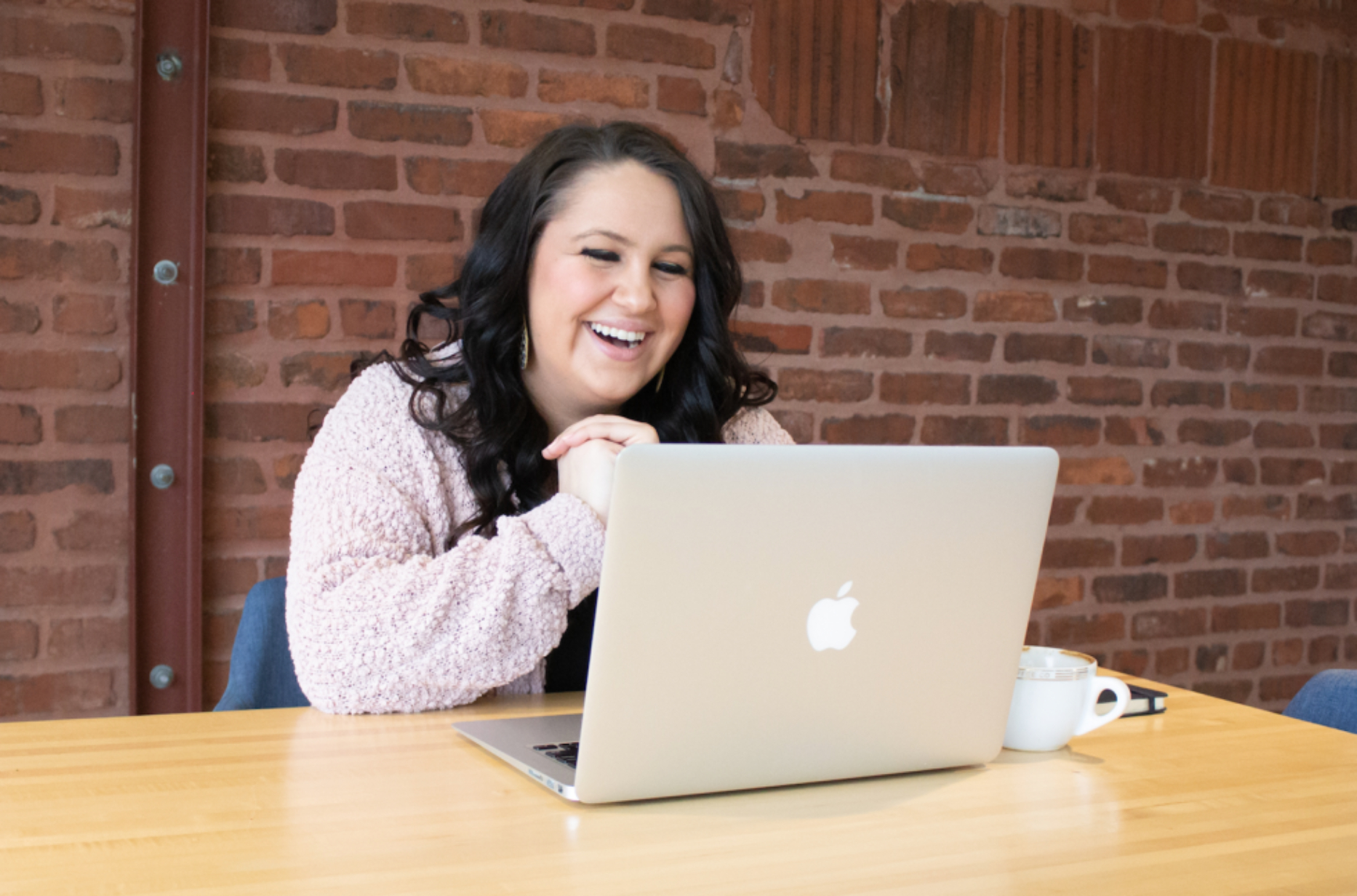
How I'm tackling this virtual semester
COVID-19 has stolen Spring 2020 from students everywhere. If you’re a senior like me, it’s an extra punch in the gut. However, despite the struggles the coronavirus has brought from switching to online classes to losing out on on-campus experiences, there is a light at the end of the tunnel.
True resilience will be built within us during this time. We will forever have an example of “how we overcame a difficult time” in an interview. We will appreciate our degree in a way many don’t. We can and will get through this trying season.
The Marines have a slogan, “Improvise, Adapt, and Overcome” which is a mindset that allows them to deal with any physical, mental or spiritual hardship. Now is our time to improve, adapt and overcome. I believe we have the opportunity to not only survive this trying season but thrive in it! While this is written for seniors, these tips can be applied for any virtual education. Here are my tips on how to make the most of the rest of this semester.
1. Mourn
This might sound like an odd step, and if you’re anything like me you tend to deal with your issues by thinking “well—others have it way worse than me right now.” While this may be true, you are going through a loss right now. Loss of in-class debates, loss of seeing your friends, loss of engaging in the club you joined, even loss of commencement ceremonies for us seniors. No matter how big or small losses, it still leaves a feeling of sadness and a lack of satisfaction. It’s still something that you were looking forward to, but now no longer have. It’s appropriate and healthy to give yourself a moment to be sad. It’s appropriate and healthy to give yourself a moment to reflect on how this loss is making you feel. Mourn the commencement ceremony you won’t attend. Mourn the friends you won’t see. Mourn the fact that this time of your life did not meet your expectations. This doesn’t make you selfish, it makes you healthy.
2. Create Your Workspace
I understand in this station the playing field for a comfy, focused, workspace is not levelled. However, we all have the ability to make any space our own. Whether it’s a traditional desk decked out with pictures that make you happy, or the dining room table with a candle burning next to you, it’s important to have a designated space you can call your own to be productive during this unsettling time.
I am in a tiny two-bedroom apartment in NY with my family. I have designated a small desk in my bedroom as my “work desk” and my back porch mixed with a lap desk and my “school desk.” My work desk has an extra monitor, a cup full of pens, and an essential oils diffuser that I put on when I’m feeling stressed. My back porch is designated for school because I need good lighting throughout my day to keep my mood up. If you can help it, try to not have your desk in the same room as your bed, or if you are like me and have to, have it facing away from your bed. It’s important to clearly distinguish rest and work time in this season, which brings me to my next point…
3. Schedule, Schedule, Schedule!
This has been my saving grace in this COVID-19-lock-in-strangeness. It is so easy for me to get out of a rhythm being stuck inside, but I have been extra intentional about keeping a weekly and daily schedule. Usually, my schedule would include activities like class, work, etc. But my “lock-in” schedule is in blocks of time that break down my entire day. In addition to my normal routine, my days will be filled with scheduled times to go on a walk, Zoom call a friend, do homework, work on building my career and meditating/praying. I cannot tell you how good I feel when I get to the end of a long day but have accomplished everything on my schedule. It also keeps me accountable to work on myself in ways I might not if I didn’t have it written down (example: 20 minutes of yoga). Scheduling gives you a sense of satisfaction at the end of the day, but it also makes it easier to view your day in 24-hour periods instead of wondering how you’re going to survive weeks of this!
4. Stay Engaged
Virtual Hangouts: I don’t know about you, but I am living for my weekly hangout with friends. Every week, I ask a friend to grab something to eat or drink with me via Zoom call. It has been a really fun way to stay in touch with people as well as reconnect with old friends. It’s not the same as meeting up downtown, but hey—I save money! Host a virtual game night, watch a movie together on Netflix Party, or just catch up with a friend.
Virtual Networking: Think forward to post this crisis. What are the things you always wish you had time for, but never do? Now is the time! Personally, working on my professional career by updating resumes, revamping cover letters, working on my website, graining industry knowledge, are all things I needed time for. Since I am alone so much now, I have been asking professors, professionals and colleagues to grab a “coffee” with me virtually about once a week. It has been a great time to gain knowledge, focus on my field and get to network with others that I usually might not reach out to. This is the time to build our network.
Virtual Counseling: Let’s be real … this time is just rough. NONE of us is actually equipped to handle this. If you aren’t talking to a licensed therapist, counselor or spiritual director, this would be a good time to. A lot of counseling offices are now offering virtual sessions. Another great example are apps, like BetterHelp, where a licensed therapist can be available via text. There is no shame in needing to process fears, disappointments or problems during this time considering many of us are dealing with this on some level.
Coronavirus has stolen a lot from us, but I believe it can be a trial that refines us to make us stronger than ever. We have lost a lot, but with the right mindset and hard work, I also believe we have a lot to gain during this time. Keep your head up high, reach out if you’re hurting and focus on what you can control during this time. You can make this a memorable, productive semester.
Class of 2020, don’t forget: You are RESILIENT.
This article was edited and reposted with permission from ericafiori.com.
Apr 21, 2020
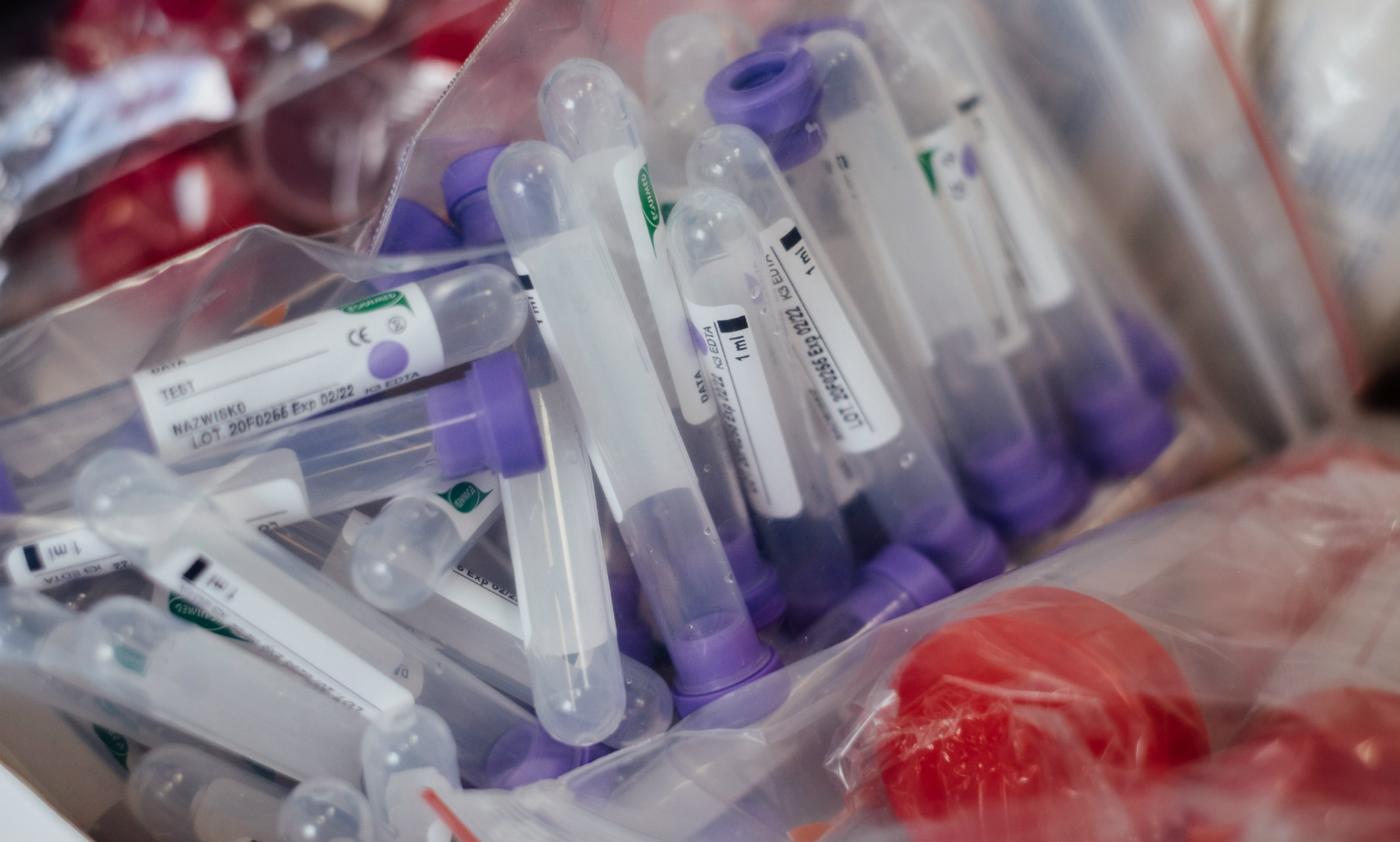
School of Biological and Chemical Sciences lends University of Kansas Health System equipment to increase Kansas City’s testing opportunities
As the coronavirus continues to spread, patient testing has become critical, but it is often unavailable. In an effort to increase detection and decrease the spread of the virus, the UMKC School of Biological and Chemical Sciences loaned the University of Kansas Health System a piece of equipment to scale up testing possibilities in the area.
When local hospitals and state laboratories received an update from the Centers for Disease Control outlining available resources for states in the battle against the COVID-19 coronavirus, UMKC faculty members realized they could help.
“We have two 7500 PCR (polymerace chain reaction) machines that are used for processing tests for the virus,” said Theodore White, dean of the School of Biology and Chemical Sciences. “We are currently not doing the kind of experiments that require this equipment, so we began to identify a provider who might need one.”
After determining that none of the facilities that are partners in the UMKC Health Sciences District had a need, the school contacted the University of Kansas Health System. The 7500 PCR will be on loan to the medical center for the duration of the crisis. The additional machine will allow KU Health System to scale up its testing capabilities, which benefits the metropolitan area.
The 7500 PCR system is small enough to fit in the back of a sport utility vehicle. The machine rapidly makes copies of specific DNA, then moves quickly through three cycles of different temperatures. This process allows scientists to take small sample and achieve quick results. The system is commonly used in processing prenatal tests and forensics testing. A new processor would cost approximately $50,000.
“When things go back to normal, the machine will come back to us,” White said. “In the meantime, we’re thrilled it’s making a difference in fighting the virus.”
Apr 21, 2020
Students may need to broaden their focus about starting a career
Tess Surprenant, director of the Bloch Career Center at UMKC, tells KSHB students should consider casting a wider net when thinking about how they will start their career.
Apr 21, 2020
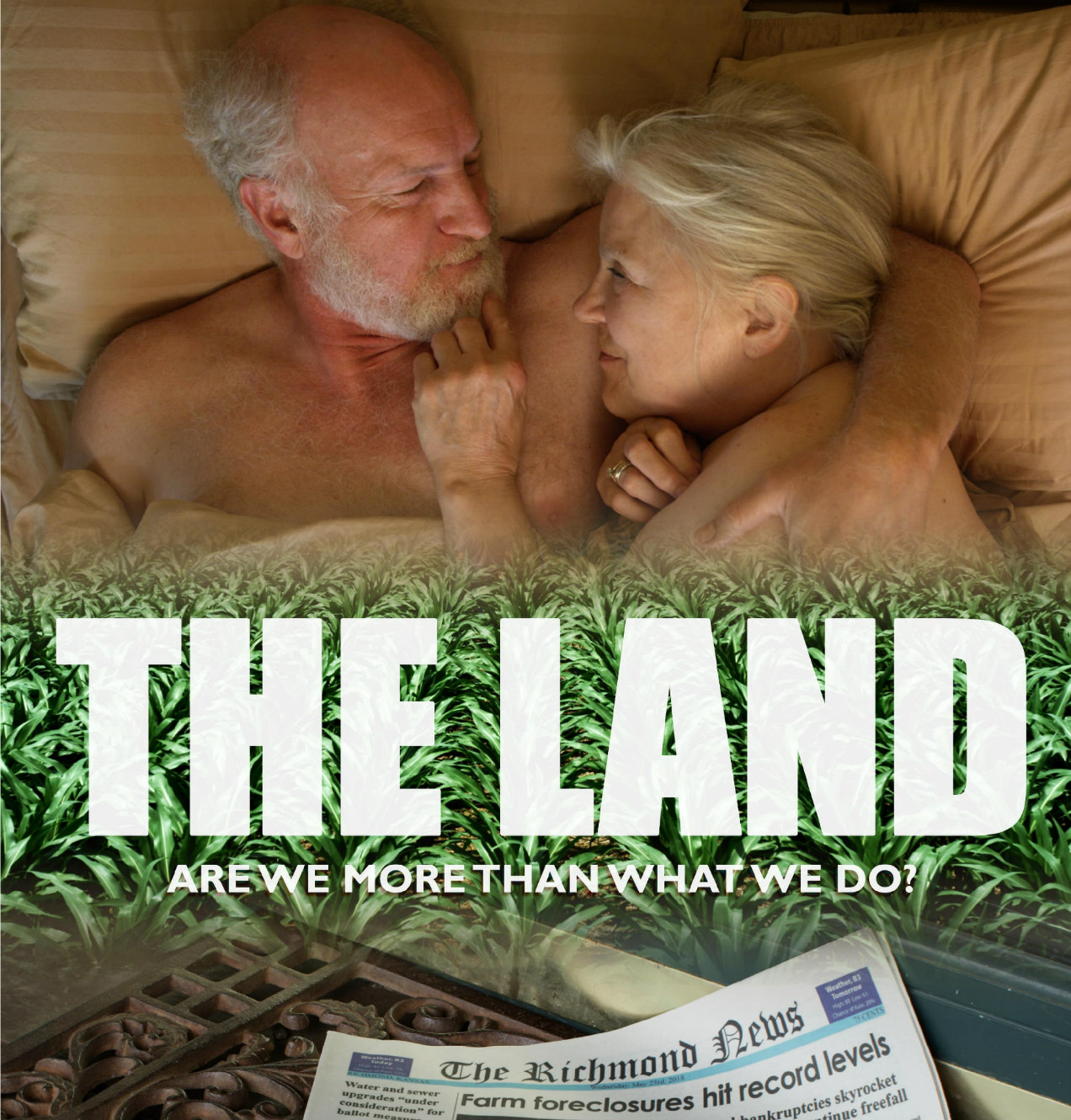
Stephen Pruitt movie on Amazon Video Direct
"The Land," available for viewing on Amazon Video Direct. deals with the current farm crisis taking place all over the United States, which Pruitt said is so severe that the suicide rate of U.S. farmers is now twice that of military veterans. It is the fourth feature film created by Pruitt and his wife, Mary Pruitt.
Pruitt said the film “asks a question on a lot of our minds today: Are we more than what we do?"
The film has earned accolades at multiple film festivals. It was one of sixteen feature films selected to play at the Dances with Films festival in Hollywood; was named Best Feature Film by Washington Post film critic Ann Hornaday at the Over-the-Rhine International Film Festival in Cincinnati; and was named Best Feature Film at the Route 66 International Film Festival and the Critic's Choice at the Iowa Independent Film Festival. "The Land" was one of only 20 non-studio-affiliated feature films (out of more than 200 submitted) to play at the St. Louis International Film Festival.
Apr 20, 2020
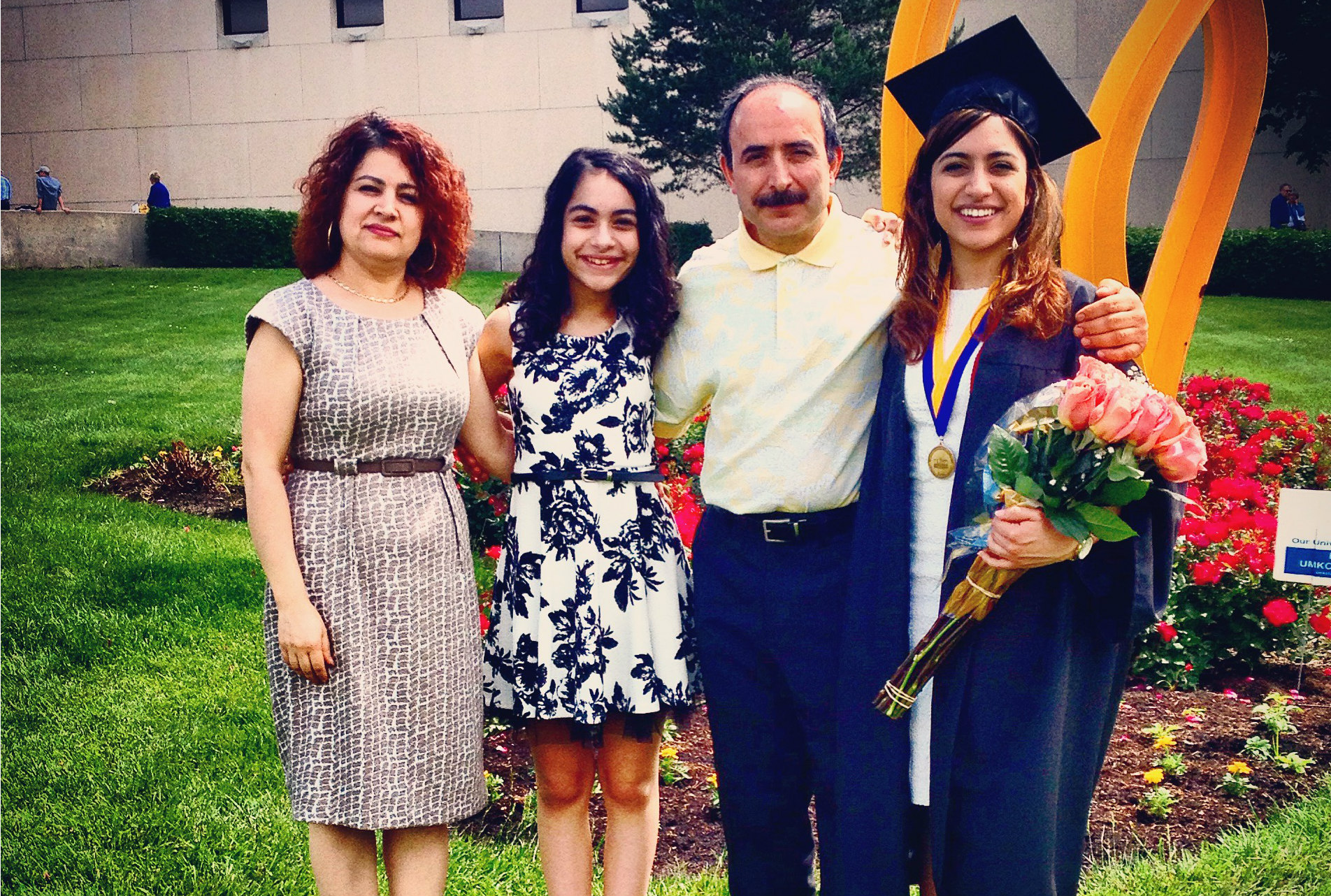
Now a Mayo medical student, Nazanin Kazemi immigrated to the U.S. knowing one word of English
Nazanin Kazemi always wanted to go to medical school and had a desire to make international collaboration a cornerstone of her career as a scientist. Kazemi recently received a Fulbright award to pursue her studies in ovarian cancer and placenta biology at the University of Geneva.
How did you feel when you heard about the Fulbright award? What difference does it make for you?
Being a Fulbright Scholar is such an incredible opportunity and I am so thankful - and still in disbelief. I really feel that being selected as a Fulbright Scholar is the realization of my "American Dream." My parents and I moved to the United States from Iran in 1999. Between the three of us, we knew about two words of English. I only knew how to say, "Hello."
My education has always been their top priority and I feel like this is a culmination of their sacrifices toward my future. We live in a truly unique country when a first-generation college student and first-generation immigrant who didn’t speak a word of English in 1999 can become a Fulbright scholar while training at one of the nation's top hospitals.
What led you to pursue studying in Switzerland?
I have always wanted to make international collaboration a cornerstone of my career as a scientist because diversity of thought and training are truly integral to the success of our research - and in turn to the options that we are able to provide patients. I am excited about the Fulbright program because their goals are so well-aligned with my own. They have a reputation for helping students establish relationships with communities all over the world in many different fields.
Living in Switzerland will not only progress my projects and training, but will also be an incredible opportunity to explore the Swiss culture. Having spent a lot of time hiking, climbing and doing yoga in the Midwest, I am excited to meet the Swiss communities around these outdoor hobbies and take advantage of the natural beauty of Switzerland's iconic mountains and hiking trails. As an avid cook, I will be able to learn more about Swiss history by learning to make traditional dishes such as raclette.
I will be leaving for Switzerland in September, if the pandemic is under control by then.
"I really feel that being selected as a Fulbright Scholar is the realization of my 'American Dream'." -Nazanin Kazemi
What are you studying and working on at Mayo?
Currently, I am earning my doctorate in immunology. I study how the maternal immune system is reactivated at the end of pregnancy to help induce labor and how this activation can cause pre-eclampsia and pre-term labor when dysregulated. I will be spending the final year of my doctorate as a Fulbright Scholar at the University of Geneva to establish an ongoing collaboration between our institutes. I will then return to Mayo to finish medical school.
I’m passionate about these areas of research because they are integral to the health of women around the world. Pre-eclampsia and pre-term labor are leading causes of maternal and fetal morbidity and mortality. Currently, diagnostics and treatment are lacking for the majority of these complications. By understanding the mechanisms involved in their pathophysiology, we can improve outcomes for women and children everywhere.
Ovarian cancer also presents a significant threat to women's health because it is often detected very late (stage III or IV) when current treatments are not as effective. Understanding the biology of this malignancy can help us provide earlier diagnoses and better treatments.
I want to be a physician-scientist to be in the service of others, and I have been incredibly fortunate to have the opportunity to train at an institution with the same dedication to service.
What led you to your interest in women’s health?
I have always been interested in women's health because I really believe that women are the most integral part of our society. The health of women all over the world has undeniable implications for the health of every facet of our society from the health and success of our future generations to the global economy. Moreover, we live in an era where, despite women all around the world making amazing progress toward our rights and fair treatment, we still face a great deal of prejudice and abuse. I am dedicated to women's health because I believe in a world where every woman feels safe, respected and treated fairly and is able to pursue her goals without fear.
As a first-generation college student and first-generation immigrant, I have always known that education is the biggest privilege. I believe those of us fortunate enough to pursue our education undeterred have a duty to those who have not had the same opportunities. I am determined to use the amazing opportunities I have been given to serve women all over the world.
I read a story where you said that your parents instilled the philosophy that women made this world and run this world. How did their perspective affect how you see the world and yourself?
My parents raised me to be a feminist. In a world where women are not treated equally and do not get to enjoy the same freedoms as men, my parents are determined to teach me and my sister that those views are wrong. Our education is their biggest priority and is the reason we moved to the United States. My dad has been dedicated to raising strong, fearless, self-reliant, independent girls. I remember being very young and fearful about many things. My dad would always say, "Go ahead and don’t be scared!"
"As a first-generation college student and first-generation immigrant, I have always known that education is the biggest privilege."
Fulbright at UMKC
Since 1946, the Fulbright Specialist Program has sponsored hundreds of thousands of students, scholars, teachers, artists and professionals of all backgrounds and fields the opportunity to study, teach and conduct research, exchange ideas and contribute to finding solutions to important international problems. To date, 18 other alumni have received Fulbright awards.
Apr 20, 2020
Professor discusses why face coverings are problematic for African Americans in public
Shopping while Black has been at the forefront of the public consciousness for years, said Jamila Jefferson-Jones, interim director for the Black Studies program at the University of Missouri-Kansas City. She is also an associate professor at UMKC School of Law. Kansas City Star (subscription required)
Apr 19, 2020
UMKC professors are guests on KCUR program, Up To Date
Beth Vonnahme, associate professor of political science at UMKC, and Allen Rostron, professor of law at UMKC, were guests on KCUR's Up to Date in a discussion about individual rights and public safety.
Apr 17, 2020
$3.3 billion grant is the continuation of the School of Medicine’s Project FIT (Faith Influencing Transformation)
Jannette Berkley-Patton, Ph.D., of the UMKC School of Medicine, has been awarded a $3.3 million, 5-year grant by the National Institutes of Health to help improve diabetes prevention outcomes with African Americans. The Comunity Voice
Apr 17, 2020
Cancellations and postponements due to COVID-19 precautions
Out of an abundance of caution during the COVID-19 pandemic, all in-person UMKC campus events through the end of June are canceled or postponed.
Please reference the UMKC Alumni and campus calendars for listings of canceled and rescheduled events as well as virtual opportunities.
Apr 16, 2020
School of Medicine dean is an expert on infectious diseases and vaccines
UMKC School of Medicine Dean Mary Anne Jackson, M.D., says there is significant risk and no scientific evidence to support the use of Vitamin C as a preventative or therapeutic tool for COVID-19. Kansas City Star (subscription required)
Apr 16, 2020
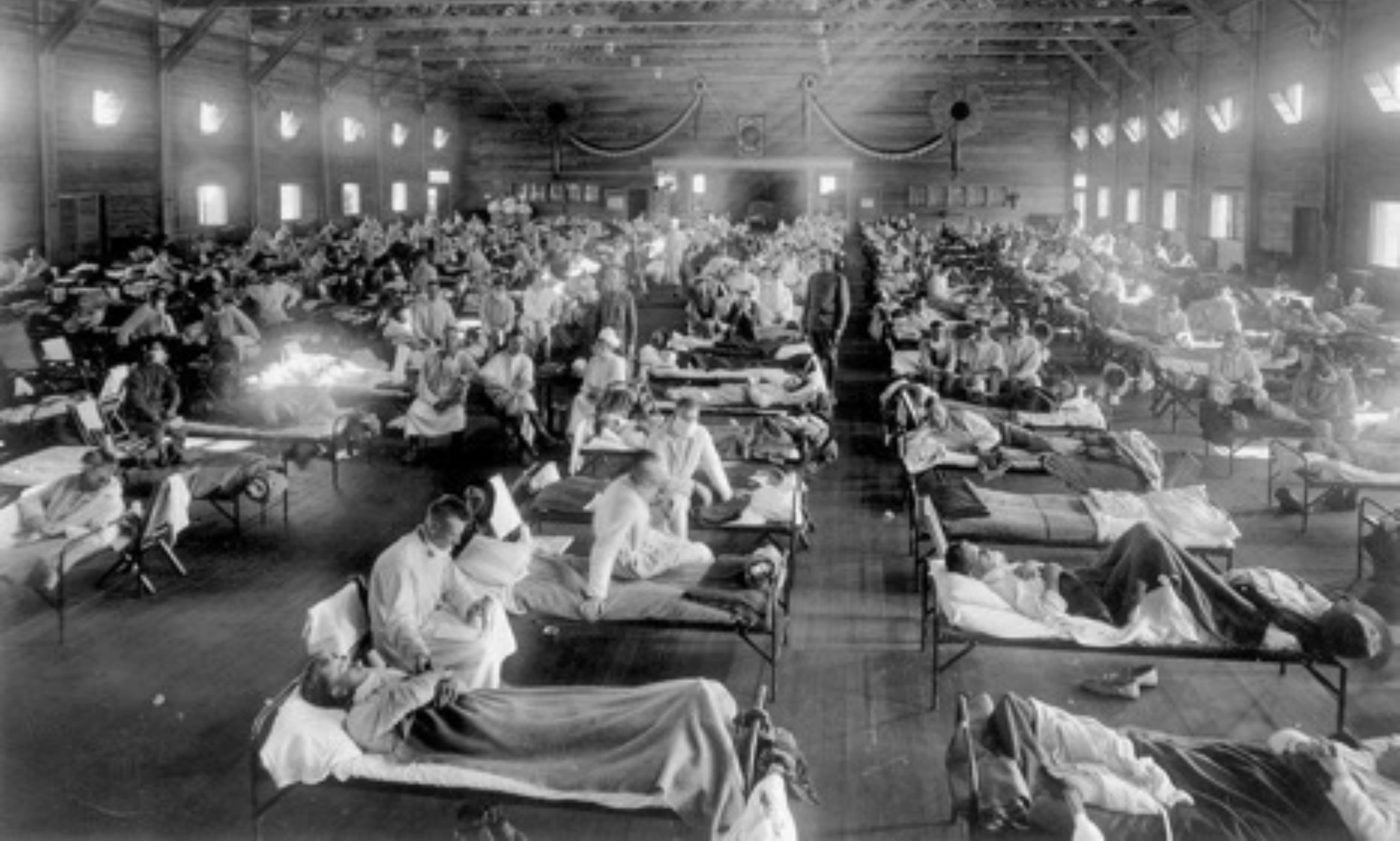
Alumna and retired UMKC librarian wrote thesis on 1918 flu
The year was 1918. The world was at war, tens of thousands of soldiers spent weeks at a time in filthy, fetid trenches and, according to Susan Sykes Berry, “medical science at the time was still arguing about what caused disease: miasmas, chemicals called zymes, or germs.” During the next three years, despite the absence of 21st century jet travel and global commerce, a horrific respiratory illness ravaged the world. Precise statistics still elude historians, but it is estimated that the so-called “Spanish Flu” infected a quarter of the world’s population and killed tens a millions of people.
A shade more than a century later, the world is a much different place, and medical science has advanced exponentially. Nevertheless, lessons of 1918 apply today, Sykes Berry said. A retired UMKC medical librarian and registered nurse, she earned a master’s degree in history from UMKC in 2010 with a thesis entitled “Politics and Pandemic In 1918 Kansas City.”
“The 1918 flu was so deadly because it was a new strain of flu,” she said. “Because of research by Jeffrey Taubenberger, Ann Reid and others published in the journal Virology in 2000, we now know it was an H1N1 strain. So no one had any immunity.”
According to her 2010 thesis, “Kansas City did not escape the influenza pandemic. Public health officials began their response by denying there was a problem, and finished their response by simply waiting for the disease to run its course. Between those extremes there was political infighting, flouting of quarantines and bans by businesses and the public, lack of coordination with Kansas officials, and many needless citizen deaths.”
Today, Sykes Berry sees parallels.
“The lessons from 1918 that apply today is that quarantines have to be applied everywhere in order to work,” she said. “It isn't effective to close Kansas, and not Missouri, when all people need to do is drive across an invisible state line. In 1918, Kansas had less death than Missouri because they had a better quarantine. I fully endorse the recommendations of the Core4 governments (the city of Kansas City, Missouri; Jackson County, Missouri; Johnson County, Kansas and the Unified Government of Wyandotte County and Kansas City, Kansas) in recognizing that Kansas City is one big metro area and for an effective response the whole metro area has to act.
“Those four governments have saved lives.”
In an interview with KCTV5, Sykes Berry said the city’s response in 1918 was ineffective because of interference from political bosses such as Tom Pendergast.
“They would not shut anything down,” she said. “Streetcars were still running and saloons that Pendergast owned remained open. The chamber of commerce, for whatever reason, was actually trying to get the city to shut down. So, businesses that were in the chamber of commerce were trying, but the city just couldn’t get its act together.”
It is estimated that 11,000 in Kansas City were infected, and 2,300 died.
Sykes Berry also said that while the news media popularized the term “Spanish Flu,” there is evidence that the disease actually may have arisen in Kansas and was spread globally by soldiers deploying to World War I from what is now Fort Riley.
“John Barry, who wrote ‘The Great Influenza: The Story of the Deadliest Pandemic in History,’ was the historian who first came up with that idea,” she said. “But in my research I was able to find mention of a severe influenza in the Santa Fe Monitor in April of 1918, and also mention of soldiers from Camp Funston (now Fort Riley) who had been back and forth during the period. So it is a plausible theory. However, almost all historians agree that it was spread so quickly by soldiers due to the war.”
Apr 15, 2020
Retired UMKC health sciences librarian was a guest on KCUR's Up To Date
Apr 15, 2020
UMKC's Charting the LifeCourse tools available to electronically document the curriculum
The UMKC Institute of Human Development (UMKC IHD), a University Center for Excellence in Developmental Disabilities (UCEDD), has developed the Charting the LifeCourse (CtLC) framework and tools to help individuals and families of all abilities and ages develop visions for a good life, identify how to find and access supports, and discover how to live the lives they want to live. Yahoo News
Apr 15, 2020
Data says Black Kansas City residents have been disproportionately affected by COVID-19
Data is critical for public health, but Jannette Berkley-Patton, a professor at the UMKC School of Medicine, says it should be shared with local community leaders before being widely released. KCUR
Apr 14, 2020
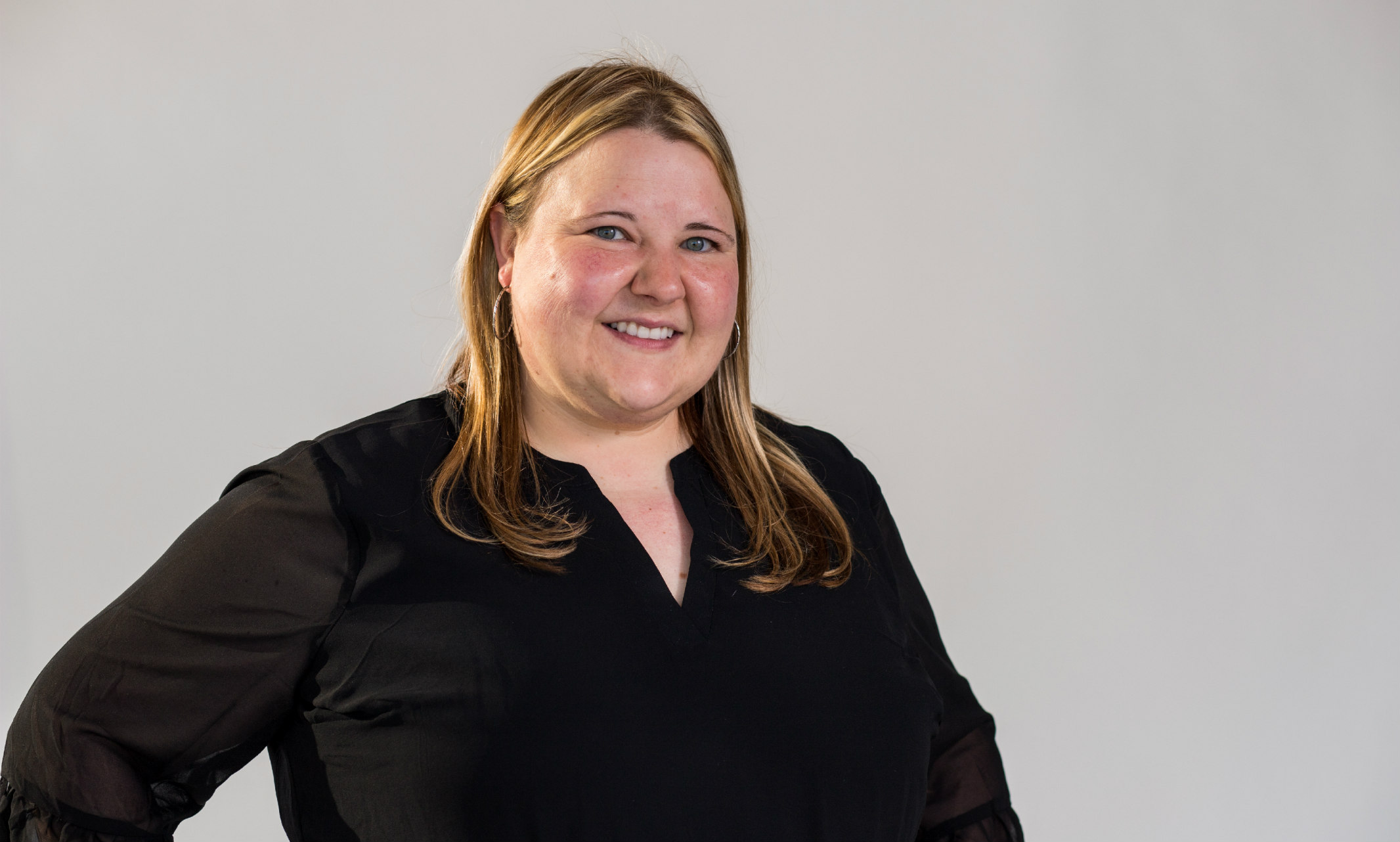
Award-winning alumna provides her favorite processes and resources for teaching at home
On top of managing working at home, shopping online and keeping everyone healthy, many parents are now bearing the weight of teaching their children at home. Deborah Siebern-Dennis, B.A. ’05, a science teacher at Bode Middle School, was selected for a two-year teaching and learning project funded by the National Science Foundation in 2019. She has suggestions to make teaching at home a little easier.
Parents have had a little time teaching at home now and many are discovering the challenges of keeping their children engaged and on task. What is one of your best tips to make the day go easier?
I would recommend having a consistent structure that is similar to a classroom setup. With my experience, kids like routine and they feel most comfortable knowing what their learning day will look like with a set schedule. For example, I am currently Zooming with my students at the same time each day and I set up a science-learning schedule on Google Classroom. My students know when activities will be posted and when our interactive sessions will be. Consistency is key!
What kind of breaks make sense? Exercise? Dancing? Drawing?
In the classroom, any brain break is good break! Since I teach middle school, my kids like to be active so we will do a cooperative activity or a student-led stretch. There is a lot of power in student choice, so I would recommend asking your child what he or she would like to do and don’t be afraid to join in on the fun! Being a goofball is fun!!
"Technology is a great learning tool when used with direction." - Deborah Sieburn-Dennis
Any tips on tackling a student’s least favorite subject? First? Last? With rewards?
It is all about perspective! This would be a great opportunity to take one of those content areas that your child doesn’t enjoy as much and explore the possibilities. See if you could make some real-world connections. Go outside and explore some science or reflect on this experience with writing. The possibilities are endless!
What are your suggestions on how parents can juggle their children’s school work when they are working also?
I would go back to the scheduling. Kids are acclimated to a daily schedule, and I would recommend setting up a daily learning routine. All of the teachers that I know are working so hard right now at creating lessons and digital learning opportunities for their students that would work great with a parent’s busy schedule.
What’s the best plan of attack with subjects that aren’t the parent’s strong point?
Please reach out to your child’s teacher! We are here for all of our families and I can’t tell you how many parents and students that teachers have been helping since this pandemic has started. Teachers love to teach and we miss the classroom so very much, and I’m certain that your child’s teacher would love to help out in any way that that they can. Can you suggest online resources that may be helpful with homework?
I like Wide Open School. I’ve also recommended a document provided by Milken Educators - I was a 2015 Milken recipient - that is full of great resources.
Are there activities you could recommend that might be productive and/or educational when students are finished with their assigned tasks?
I’m a big fan of Quizizz Reviews. The parents can research a topic and assign the review as homework. I create my own assessments, but it’s a great resource for formative assessment data. I would also recommend iReady if it is used at your school. Based on what we know about the effects of electronics - TV, gaming, etc. - what are your suggestions for limitations? And should they be used as a reward?
Technology is a great learning tool when used with direction. I teach at a 1:1 school (one device per student) and it is so valuable right now during this digital learning time. I would recommend that parents monitor their child’s device time and explore the possibilities together. It’s also a good idea to remind their child to be a responsible digital citizen.
Apr 13, 2020
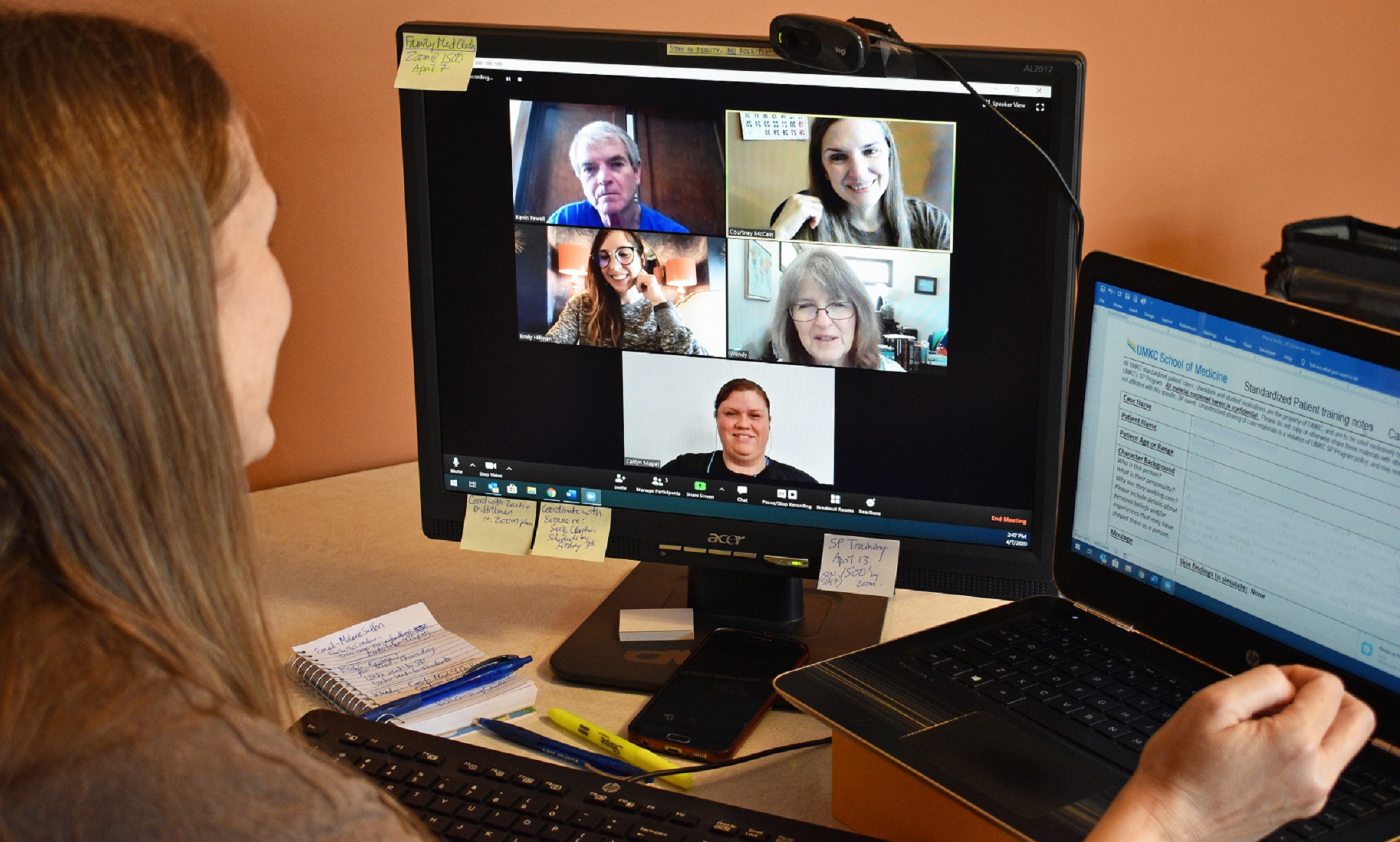
Expanded telemedicine exercises help UMKC medical, nursing students keep learning
When coronavirus precautions canceled hands-on clinical experiences for students, UMKC medical and nursing faculty and staff had to get creative. Their spring break turned into a fast break to create online replications of direct patient contact.
A School of Medicine program switched its in-person patient contact modules to a telemedicine format. And the director of the School of Nursing and Health Studies’ simulation lab brought two high-tech manikins home with her, so students could still use them to learn, albeit remotely.
As a result, half a dozen medical and nursing classes logged clinical training online, just in the first week after break, and that pace will pick up in weeks to come.
Education on the line
On April 2 and 3, 95 students in the UMKC nurse practitioner program interviewed and assessed 10 patients with varying health conditions, all without risking any contamination.
That’s because all the interviews were done by video conference — telemedicine style — rather than in person. And their “patients” were from the School of Medicine’s Standardized Patient Program, which has 60 people trained as medical actors to present dozens of possible conditions to student learners.
“Several training events had to be canceled in the immediate aftermath of the COVID-19 closures,” said Courtney McCain, the program coordinator. “Faculty members and I hurriedly emailed, phoned and Zoomed to come up with alternatives for our April events.”
As a result, the students in the nursing school’s nurse practitioner program had video conferences with their “patients.” Then they were rated on how well they interviewed them and took their medical histories, and on how well they communicated with them.
“Our standardized patients also are trained in constructively assessing how well the students communicate, which they will do after running through their scenario so the students can learn from these experiences,” McCain said. “Ordinarily, this exercise would have included a hands-on, physical exam. But we have modified its objectives to emphasize students’ ability to take a competent patient history and to communicate professionally.”
There were some first-week glitches, as bandwidth bottlenecks and software quirks were discovered. But five students who submitted comments were all positive about the exercise, which let them see their patient’s chart well in advance, so they could be prepared for the examination.
Two students, Tiffany Arnold and Abby Martens, said they had handled real telemedicine appointments shortly before campus shut down. The exercise “was very accurate, with no real difference from the visits I was doing in the last month,” Arnold said. Martens added, “I thought it was realistic. I worked with a physician one day a couple of weeks ago who did telehealth all day, and it was pretty similar.”
Another classmate, Catharine Cooper, said, “My actor was fantastic as a patient and really seemed like patients that I have seen in clinic, when I was at clinic.”
“This experience is helping us realize how much more we can do in a telemedicine setting. We’re growing our repertoire of simulations and possibilities.”— Courtney McCain
McCain said some tweaks had been made after the first sessions, so things should go even better for the next large group of nurse-practitioner students who have a similar exercise. The first students for a revamped exercise in the School of Medicine program just happened to be from the nursing school, she said.
The program is overseen by Emily Hillman, M.D., director of simulation for the UMKC Clinical Training Facility. Hillman, an assistant professor, earned her M.D. and a recent master’s in medical education from UMKC. Now she and other faculty are devising the online versions of fourth- and fifth-year medical students’ clinical experiences in family medicine, pediatrics, surgery and in-patient hospital visits and treatment.
McCain has been with the Standardized Patient Program since 2011 and has seen the number of training scenarios it presents grow 450 percent. Now, as challenging as it is to shift all clinical training online, she sees an opportunity for more growth and creativity. A recent international webinar with other directors of standardized patient programs also gave her some more ideas and troubleshooting tips.
“It’s been a crash-course in new technology, along with everything else. We are rapidly making lemonade,” McCain said. “This experience is helping us realize how much more we can do in a telemedicine setting. We’re growing our repertoire of simulations and possibilities, so if the COVID-19 closures continue, we’ll be in a good position to continue delivering scenarios to students so they’ll have minimal interruption in this portion of their studies.”
Smart use of dummies
Christine Zimmerman’s house recently added a couple of occupants, but she didn’t have to put them on her Census form. Her guests, one adult and one child, are manikins from the nursing school’s simulation lab.
Nursing students normally spend hours in the school’s high-fidelity simulation lab, managing patients with complex clinical issues while practicing assessment and communication skills. When Zimmerman heard that access to campus buildings would be greatly restricted, she got the idea to set up a smaller version of the lab in her basement.
“We have nine manikins, but I can adapt most simulations with these two,” said Zimmerman, who has a master’s in nursing education and a Ph.D. in nursing from UMKC, in addition to her R.N. “They breathe; they blink. They’re computer controlled. You can monitor their heartbeat and other vital signs.”
Students can’t come to her house, but groups of around eight meet online and can see and guide Zimmerman’s assessment of the patients. Other simulation staff members are online, too, and can speak for the manikin as the students ask questions.
The class members can discuss the case among themselves, but they have to be tactful about what they say in “earshot” of the patient. And if they decide medicines are needed in a particular scenario, they can make a virtual stop by a “meds station” Zimmerman has set up. There she can hold labels up to the camera so a student can verify that the right pharmaceutical is being dispensed.
Zimmerman started the lab sessions the Tuesday after spring break and is running four or five a week, as she usually does when she has access to the full lab.
“The sessions run either four hours or eight hours,” she said. “We cover a lot of ground, and I’m pleasantly surprised with how successful this transition has been.”
Students agreed. Madison Putnam, a senior nursing student, said, “I am grateful UMKC and Dr. Zimmerman have found ways to continue to provide us nursing students as much ‘hands on’ education as possible.”
Natalie Patton, a junior said, “Dr. Zimmerman's recreation of SIM lab was amazing. And it was wonderful to work with more of my classmates than an in-person simulation would have provided. Though we had to take turns talking, the online format did not impede our communication at all, and we were able to efficiently work together and save the patient in crisis.”
Zimmerman also said it was a bonus for her to have a whole group of students online so she can hear their discussion of cases, something she can’t normally do when a class huddles up out of her earshot.
“If anything, they are more focused on the critical thinking and clinical evaluations they have to do,” Zimmerman said. “Of course, I’m sorry for the situation that makes all this necessary, but I enjoy the challenge and the need to take a creative approach to these challenges.”
Apr 13, 2020
Coaches help athletes succeed by helping each other
It’s a new time for college athletic programs, and UMKC Athletic Director Brandon Martin is trying to get creative, starting RISE Alliance, Roos Inspiring Success and Excellence. Fox4KC
Apr 13, 2020
Films are part of KCFFI’s Heartland Student lineup
UMKC student Mayhrn Rose’s short film “My Sappho” is part of KCFFI’s Heartland Student lineup. UMKC graduates Paola Prada and Jackson Montemayor collaborated on “The Colombian,” another entry in KCFFI’s Heartland Student category. KCUR
Apr 12, 2020
UMKC archivast applies lessons learned from AIDS epidemic to COVID-19 pandemic
The current COVID-19 pandemic reminds Stuart Hinds, archivist at UMKC Miller Nichols Library and head of the Gay and Lesbian Archives of Mid-America (GLAMA), of AIDS in the 1980s. KCUR
Apr 11, 2020
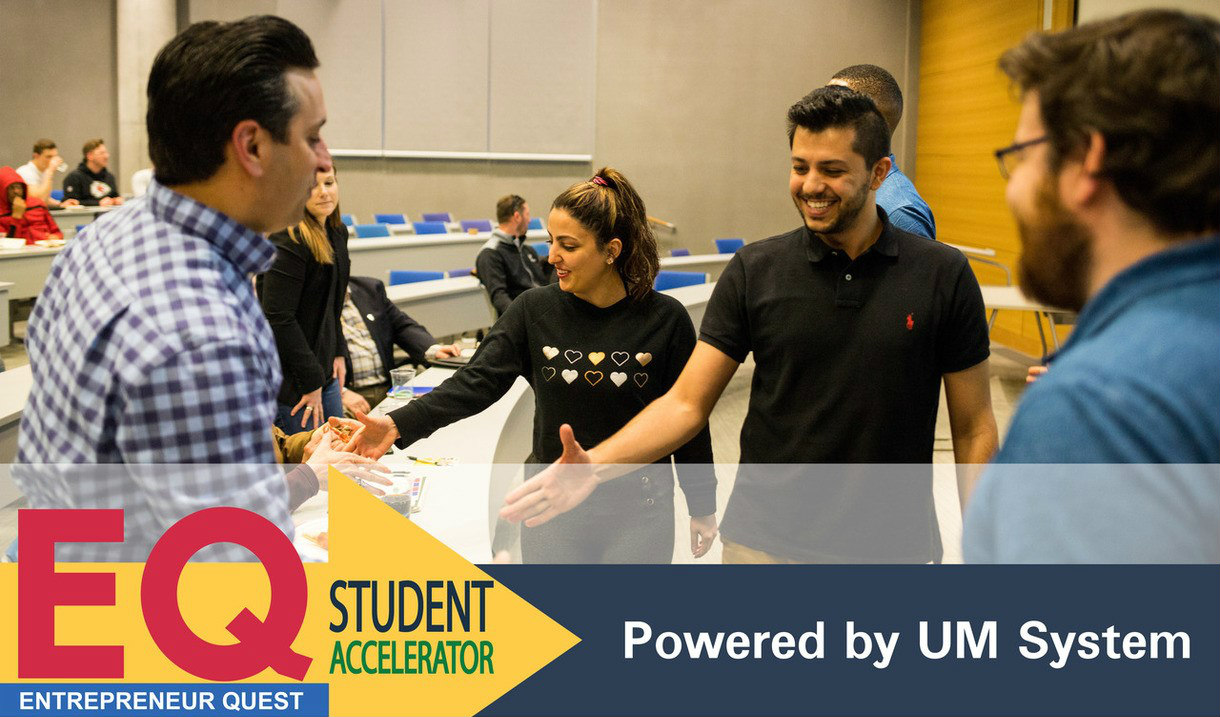
UMKC students will compete at UM System Entrepreneurship Quest Student Accelerator Pitch Competition
Three UMKC student teams will compete against the top finalists from Mizzou, Missouri S&T and the University of Missouri-St. Louis in the University of Missouri System Entrepreneurship Quest Student Accelerator.
The UMKC teams secured their spots in the March 25 competition. First place went to Genalytic. Second place went to Compost Collective KC. Third place went to Vest Heroes.
The student entrepreneurs were all solving problems through their business ventures. UMKC, MU, S&T and UMSL held workshops during the fall semester that covered business models, venture pitching and the EQ application process. University representatives and community leaders chose the most promising applicants, who participated in a pitch competition to narrow the field to 10 semifinalists. Student teams chosen during the first competition had the opportunity to participate in an eight-week EQ educational program.
The EQ program included workshops, mentoring, demo days and coaching from local entrepreneurs. The purpose is to help students research, develop and practice pitching their concepts based on feedback from business leaders, investors and subject-matter experts. At the end of the program each university held another pitch competition to choose three finalists and proceed to the EQ finals this week.
Round one of the finals starts at 4 p.m. April 15. Twelve teams will present on Zoom to a panel of judges recruited by each school. The top three present again in round two at 1 p.m. April 16 for a different panel of judges.
Winning UMKC Ventures
Genalytic
Greyson Twist, Ph.D., bioinformatics and computer science major, founded Genalytic. He describes Genalytic as a way to prescribe the right drug for each patient based on their genome.
“Pharmacogenomics sounds, and is, really complicated; but the idea is that every time you take a new drug or combination of drugs, or even drugs and food, you toss the dice and hope you are going to be OK,” Twist said. “Usually you are, but sometimes the drug doesn't work. The drug makes you worse, or the drug kills you. We aim to fix that problem.”
Twist left his job at Children’s Mercy a year and a half ago and started working on Genalytic full time. He considered using Genalytic for a PhD project only. But friends and family convinced him there was business value in his idea. At about the same time, Twist learned about the EQ program and decided to give it a try. The tag line he has been using is “putting the person back in personalized medicine.”
“We have a very long way to go, but the EQ program is – was – the first step. And the support they have given me has really put wind in my sails to try and make this a reality,” Twist said. “If you have an idea or go to the EQ program, you literally have nothing to lose.”
Compost Collective KC
Kyle McAllister, business administration graduate student, leads Compost Collective KC. The company’s goal is to solve two fundamental problems. The first is a global issue. McAllister said food waste is a major threat to the environment and is produced in the United States at an alarming rate. Approximately 30% to 40% of all waste going to landfills in the U.S. is food. He said that equates to approximately 33 billion pounds of food in landfills per year. That volume would fill the entire Rose Bowl in Pasadena, California, each day for an entire year.
McAllister said food waste breaks down in a landfill without oxygen and, as a result, emits methane gas. Depending on the study, McAllister said methane gas has 25 to 84 times the climate-change impact than carbon dioxide. Given this issue, people are looking for more sustainable alternatives. McAllister cited a recent Yale study that found that 70% of Americans think environmental protection is more important than economic growth.
McAllister believes Compost Collective KC can help solve a second problem – give people a simple way to have a positive environmental impact by composting.
Kyle’s partner is Meredith McAllister, co-founder. They are preparing for the April competition by incorporating feedback from the judges, practicing the pitch with their team and presenting to Kyle’s MBA class for feedback.
“I've learned a lot! It's been a blast to participate and see some of the other really great ideas competing in the program,” McAllister said. “I've improved my presentation skills and the competition has also pushed us to think critically about our business, and that has helped us make some helpful decisions.”
Vest Heroes
When UMKC School of Medicine student Fahad Qureshi started shadowing physicians, he saw that surgical operations involving an X-ray or radioactive imaging technology often requires the health care professional to wear a lead vest and skirt. The equipment was very heavy, weighing between 30 and 69 pounds.
Qureshi said surgeons complained of back pain and hindered operational mobility due to the excess weight. In addition, Qureshi said the pain worsened for physicians as they worked long surgeries and as they aged. To solve this problem, Qureshi realized he needed to add an engineering element to his medical background. He started an apprenticeship with a local engineer and learned how to work with his hands. Qureshi said his eyes were opened to the problem-solving nature of the field. He soon started constructing his own prototypes based on the action of pulleys and levers.
The prototype consisted of a lead vest/skirt with a tether. This tether was hooked to a cord that ran to a small hook on a ceiling. Finally, the cord was connected to a weight that offset the weight of the vest. In this way, a simple pulley was created. He contacted an interventional nephrology practice in Chicago that uses radioactive imaging called A.I.N., who allowed him to build a model in the operating room with special sterile materials. Qureshi used a 50-pound weight to make a 60-pound vest and skirt feel like just 10 pounds. The physicians at the practice were astounded and asked for more, citing their immense need.
“My preparation comes from trying to advance the company,” Qureshi said. “I’ve pitched the product to doctors in hospitals across the country, most notably at the Mayo Clinic. I intend to pitch the huge progress and real-world applicability.”
“I have learned what it takes to build something, and this program has given me an opportunity to take an idea to a business,” Qureshi said. “I saw a problem when my childhood friend's passing was partially the result of pain and limited mobility of the physician wearing a heavy lead vest that complicated the operation. I saw an opportunity to create a solution. I want people to know that I, like every member of the health care team, want to serve patients better and help them achieve the longest, healthiest life possible,” Qureshi said.
Apr 10, 2020
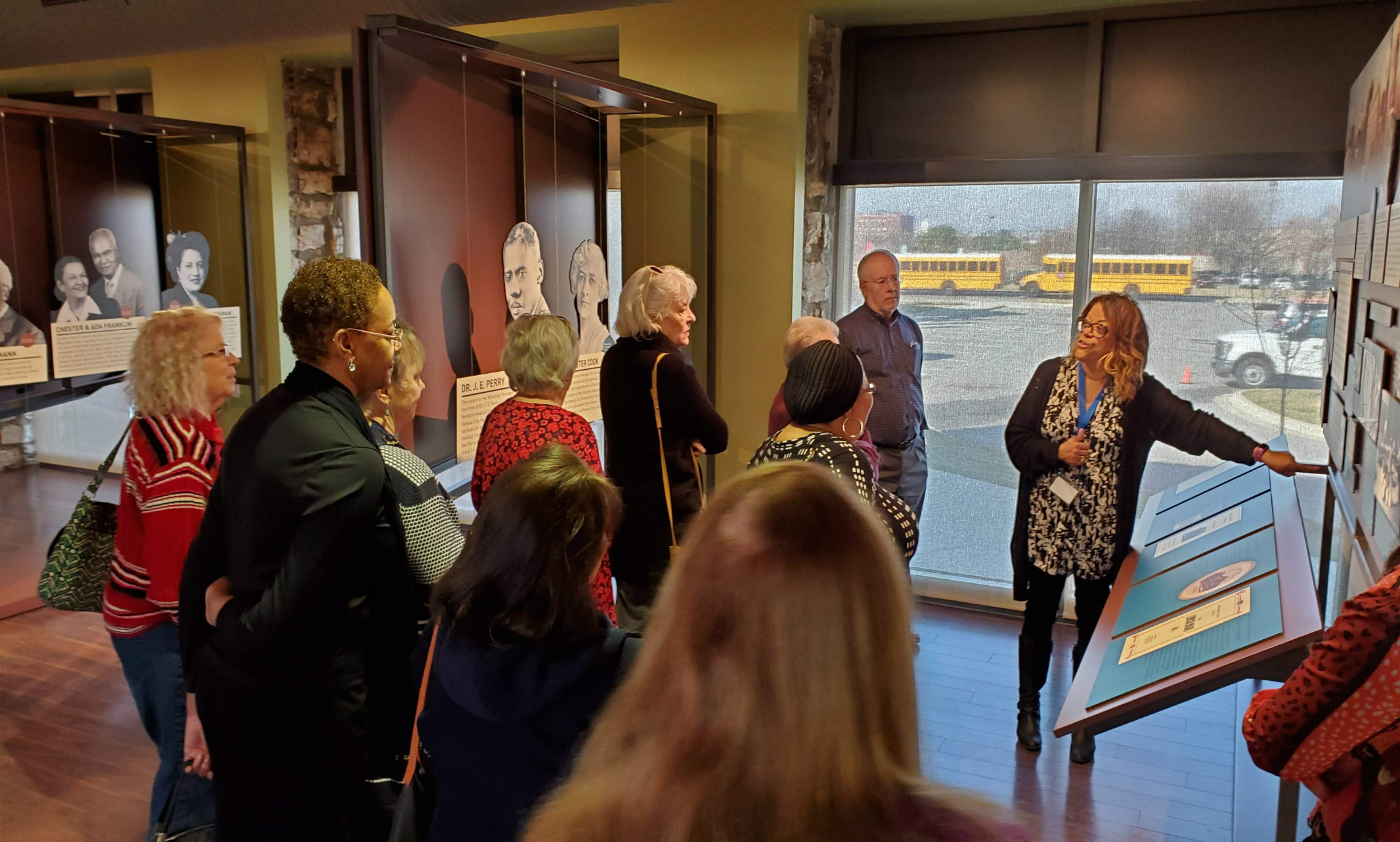
Carmaletta Williams shares some of the rich history housed in the archives
Carmaletta Williams (B.A. ’87) serves as executive director of the Black Archives of Mid-America in Kansas City. The archives are home to incredible artifacts documenting the social, economic, political and cultural histories of persons of African American descent in the central United States, with particular emphasis in the Kansas City, Missouri, region.
Carmaletta Williams, B.A. '87
We spoke with her about what she wishes people knew about the archives and her favorite pieces among the exhibits.
Tell us about your role as executive director at the Black Archives of Mid-America in Kansas City.
My role primarily is to keep the place afloat. That pertains to many levels: financially, educationally, exhibition-wise, public partner duties, arts advancement, personnel, programming and so many other duties.
What’s something you’ve learned by working at the archives?
I've learned that being the administrator at a museum or public organization is not a one-person job. It takes a crew with different skillsets, abilities, desires and commitments to make the Black Archives a rich, viable part of the Kansas City landscape. I would love to spend all my time taking people on tours and talking about the history of Black folks in Kansas City and, indeed, in this country, but that is not possible. I learned that my efforts are better directed towards financial management e.g., fundraising, paying bills, writing grant proposals, etc.
What is something you wished people knew about the archives?
I wish people knew that there is an active (except in the age of quarantine) Black Archives with a wonderful Ewing Marion Kauffman Exhibition Hall. The fixed exhibition in that hall chronicles the establishment of Kansas City through the lives of the African Americans who worked toward building lives and culture for their families and their communities. I wish people knew that those early actions frame today's Kansas City.
I wish people knew that we are building another exhibition in the area that houses Lucy's cabin, the home of an enslaved woman in Trenton, Missouri, that will pay honor to the victims of racial lynching. Charles Swayze, a talented, young African American artist is creating a wall-sized mural for that exhibition.
Lucy's cabin in the Black Archives of Mid-America.
I wish people knew that women's professional basketball began in Kansas City with the Women's Basketball Association, started by Lightning Mitchell. The Black Archives houses their Hall of Fame as a permanent exhibition.
I wish people knew that we are a beautiful facility with spaces that we rent to people, groups and organizations throughout the area. We also provide a wide array of educational programs, including workshops on mental health with Dr. Erica Thompson and on legal issues with the Jackson County Bar Association. Additionally, we host poetry readings, book signings, fitness workshops, musical presentations and more.
Painting of Henrietta Lacks on display in the Black Archives of Mid-America.
Favorite artifact, document or photo in the collection?
I have many "favorites" in the Black Archives. I love the poster-sized picture of Fannie Lou Hamer, the woman who made history by saying she was "sick and tired of being sick and tired." Another favorite is the picture of our founder Horace M Peterson III. Sadly, it hangs next to his obituary. Eva McGhee's gift of a portrait of Henrietta Lacks brings joy to me and the Research and Reading Room. I smile in every room of that space because the Archives is filled with history, art, music, culture, poetry, literature, business, and all those elements that create communities.
How can people support the Black Archives during this time?
People can support the Black Archives during this time by making donations online. When you visit our website, be sure to scan through our holdings. We are developing programs that can be accessed online and are eager to hear what community members want from us.
Apr 09, 2020
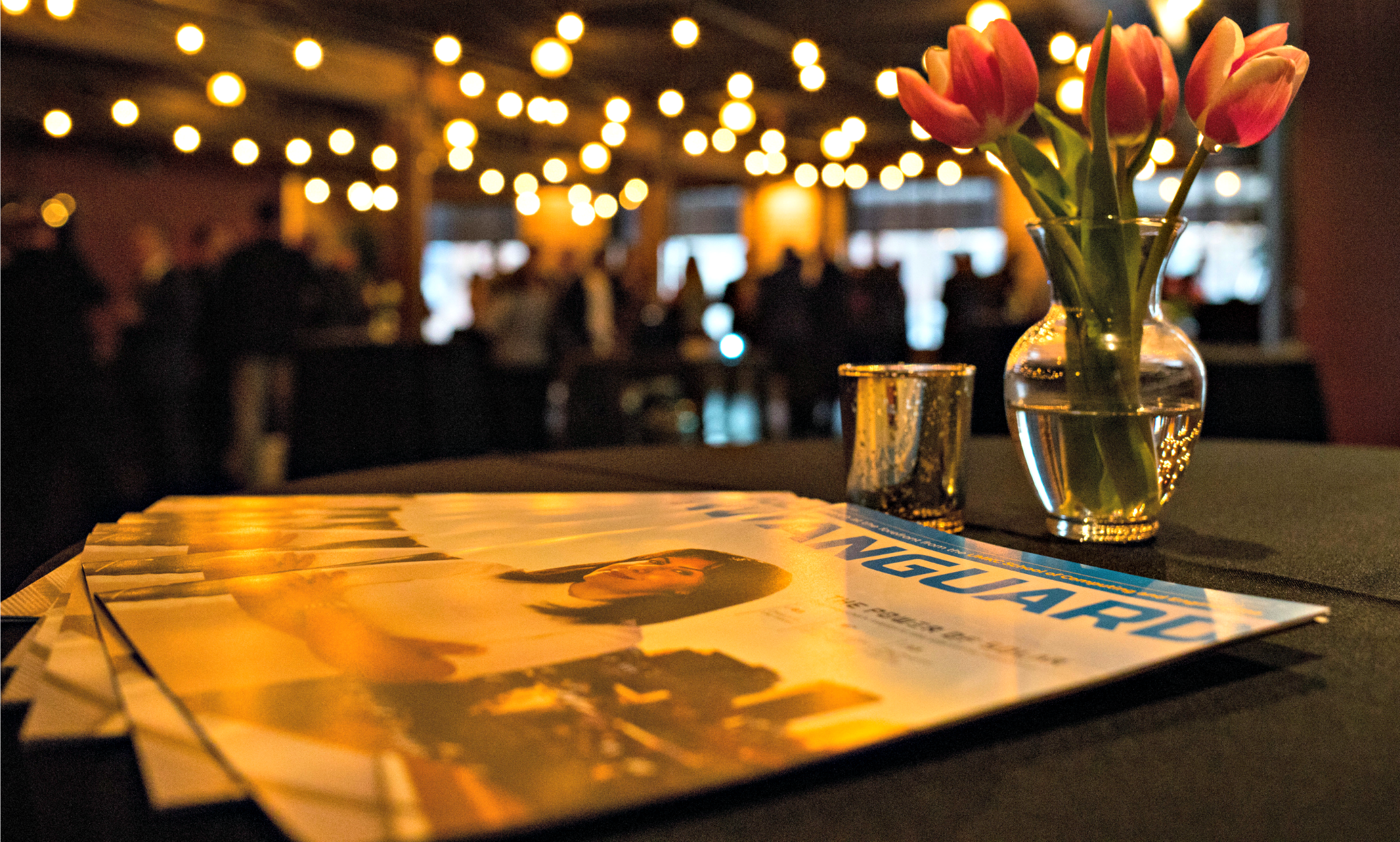
KC Water, Prep KC, two SCE Alumni are among this year’s Vanguard Award recipients
From donors to student mentors to community partners, the role of alumni and friends is essential to furthering the mission of the University of Missouri-Kansas City and its School of Computing and Engineering. The annual SCE Vanguard Awards is an opportunity to spotlight those who help expand STEM education and outreach in Kansas City.
“This is a great opportunity for us to recognize the key role that our alumni, corporate and community supporters play in making the School of Computing and Engineering the success that it is today. This group of honorees is just a small depiction of the outstanding leaders in engineering that we have the opportunity to connect with every day,” said Kevin Z. Truman, dean of the School of Computing and Engineering.
This year the school will recognize four honorees in the categories of SCE Young Alumni Award, SCE Supporter Award, STEM Outreach Partner and Organization of the Year.
2020 SCE Vanguard Award Recipients
Young Alumni Award: George White, Jr., BSCE ‘13, civil engineer, GLMV Architecture
George White, Jr., SCE Alumni Association director-at-large and Engineers Without Borders mentor, has a knack for giving back. Heavily involved in the Kansas City community, White is a staunch supporter of Big Brothers Big Sisters of Kansas City, Christmas in October and other mentoring programs that affect underrepresented youth. As a civil engineer at GLMV Architecture, White’s primary role consists of business development and engineering site design for facilities, though he takes great pride in his responsibility to apply his skills to the greater good.
SCE Supporter of the Year: Sherry Lumpkins, BACS ’93, principal, Blue Symphony
Lumpkins’ dedication to STEM education, community service and the School of Computing and Engineering is demonstrated though her company and her personal volunteer activities. Lumpkins has served as a UMKC Legacy Summit Leadership Conference Workshop facilitator, KC STEM Alliance Girls In Tech Hour of Code volunteer and a panelist for Computer Science Teacher Mentor Day hosted by KC STEM Alliance, Science City, Project Lead The Way and the KC Tech Council.
As an African American female owner of an information technology firm, Sherry Lumkins is a prime example of the value that women and people of color bring to STEM. Since 2017, Lumpkins has employed six School of Computing and Engineering interns, three of which she currently employs, showing a commitment to improve students’ education through valuable hands-on experiences in STEM.
Outreach Partner of the Year: PREP-KC
The mission of PREP-KC is to develop leverage and deploy resources to improve Kansas City’s urban and regional educational outcomes by strengthening relationship between students, teachers and parents and by improving teaching learning. Founded in 2006 as Kansas City’s leading urban education intermediary, Prep-KC aims to improve college readiness and access to high-quality employment for more than 60,000 students and families served by six of Kansas City’s bi-state urban school districts.
PREP-KC has several STEAM partnerships where students are earning Market Value Assets, industry-recognized and valuable skills that help students transition more seamlessly from high school to college and career.
Organization of the Year: KC Water
KC Water is committed to providing excellent water, wastewater and stormwater services that ensure the health and safety of half a million Kansas City residents while safeguarding regional water resources for future generations. In order to maintain this commitment to customers and community, KC Water has a long-standing reputation of recruiting and retaining a workforce consisting of several graduates of the School of Computing and Engineering. Currently, there are nearly a dozen UMKC graduates in KC Water’s engineering department.
One notable employee is John Hitson, a 2018 UMKC mechanical engineering graduate who serves as a Project Manager on KC Water’s Wastewater Systems team. In his first nine months, Hitson has been assigned several infrastructure-improvement projects. Specifically, he is serving as a project manager of a critical repair project on a 12-foot diameter brick arch sewer that failed in the West Bottoms and created a sinkhole in the summer of 2019.
The School of Computing and Engineering recently announced a partnership with KC Water and other stakeholders – including FEMA, Unified Government and the Army Corps of Engineers — to launch the Center for Urban Stormwater Research, a research consortium focused on tackling urban flooding in Kansas City.
Plans to formally recognize the 2020 Vanguard Award recipients will be announced at a later date.
Apr 09, 2020
Max Skidmore weighs in on the COVID-19 pandemic and politics
Max Skidmore, a political science professor, says President Donald Trump’s long-standing high metabolism for controversy and scandalvmake him uniquely positioned to take advantage of a deadly pandemic in ways that previous presidents would never have considered. Washington Post
Apr 09, 2020
Political science professor talks about state officials response to the pandemic
Greg Vonnahme, professor of political science, talks about comments made by candidates in the Missouri governor's race about the state's response to COVID-19. KFVS
Apr 08, 2020
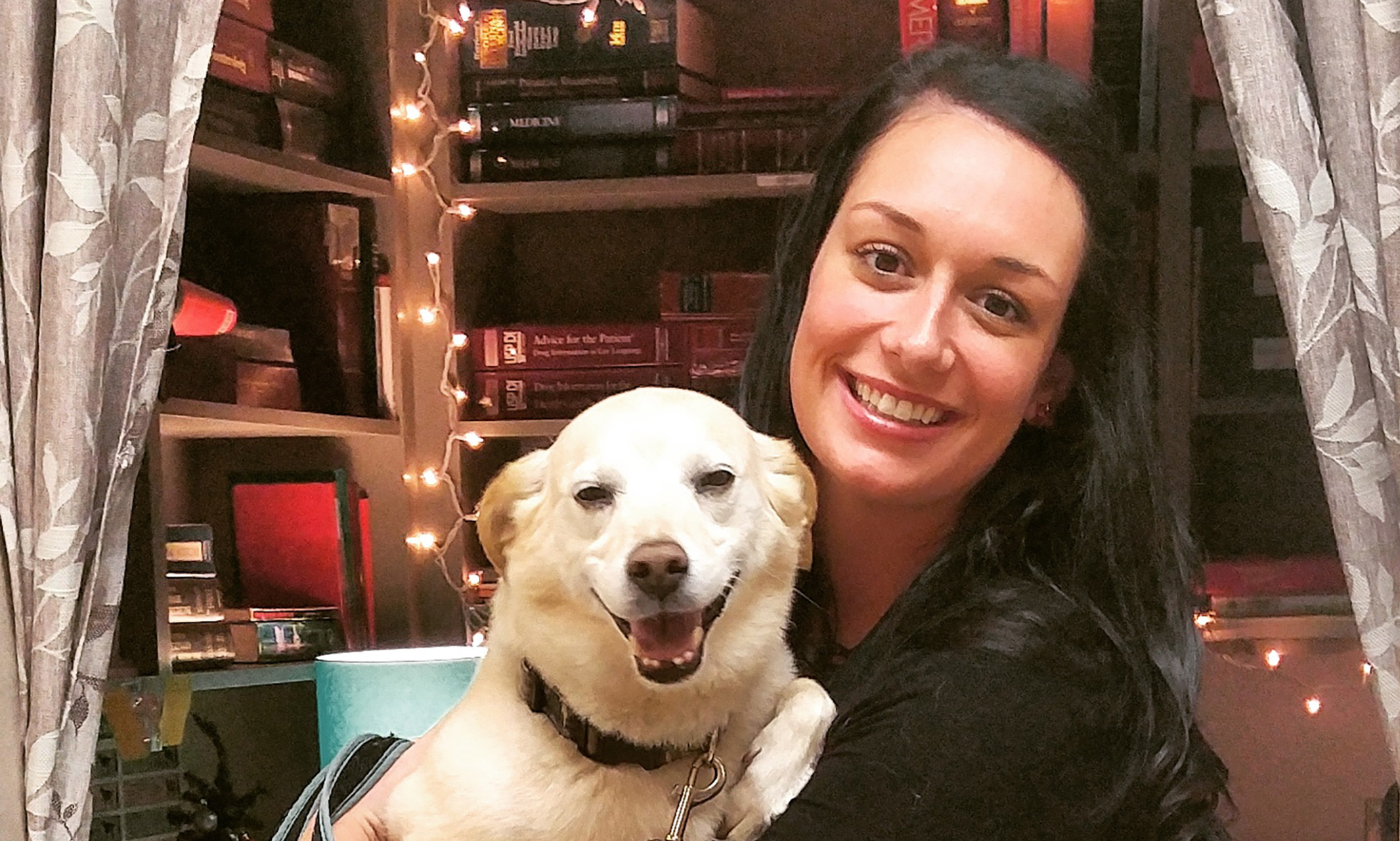
Emma Stafford, Pharm.D., is part of the One Health initiative, exploring the links between animal health and human health
A world thrown into the rapidly spreading COVID-19 pandemic is discovering the harsh reality of a shared environment where animal health and human health are intertwined.
More than half of all infections and diseases contracted by humans can be spread by animals. In fact, in the United States alone, tens of thousands of people each year fall ill from diseases spread by animals.
At the UMKC School of Pharmacy, Emma Stafford, Pharm.D., is working on a Centers for Disease Control initiative that is also at the forefront of BioNexus KC to address those concerns. One Health is a collaborative of researchers and health care providers in human and veterinary medicine working together to improve the health of people and animals.
“One Health is the idea that human and non-human species and the environment all play off of one another,” Stafford said. “We each have similar issues that can definitely have a massive effect on one another. COVID-19 is an unfortunate, but a good example of that. What we’re seeing right now is a virus that previously infected bats and has now been able to spill over or jump to humans.”
She explained that environment plays an important role in One Health as well, particularly in regard to our food sources. The COVID-19 virus that reportedly began from people in China eating infected bats is a prime example of the effect of interaction between environment, animals and humans on our human health, Stafford said.
“A lot of the concerns for those spillovers of diseases from animals to humans do come from countries like China where they eat lot of what we would consider non-traditional animals,” Stafford said.
Stafford is part of a select group of pharmacists trained in veterinary medicine. A member of the Veterinary Hospital Pharmacists, she is also one of only 28 pharmacists in the country with Diplomate status in the International College of Veterinary Pharmacy.
“One Health is the idea that human and non-human species and the environment all play off of one another. We each have similar issues that can definitely have a massive effect on one another. COVID-19 is an unfortunate, but a good example of that." - Emma Stafford
After joining the UMKC pharmacy faculty in December, she is currently working on establishing a laboratory to expand the research she began a few years ago as a clinical veterinary pharmacy resident at North Carolina State. She is also working to add two new veterinary electives to the UMKC School of Pharmacy curriculum.
A part-time retail pharmacist in Kansas City, Stafford is expanding her comparative medicine research, a multi-institution effort that is evaluating the presence of autoantibodies, commonly seen in human diseases, in dogs with neurologic disease.
“If we can develop drugs to help these animals, we can also help move human drugs forward faster,” Stafford said. “That’s where being a pharmacist trained in veterinary medicine, as very few of us are, have such a unique role. I describe it as being a conduit between the human and the animal world or between a physician and a veterinarian. You can straddle both worlds and help them both.”
Stafford is working with research colleagues at UMKC, Kansas State University and North Carolina State to create a unique information sharing initiative that could potentially save pharmaceutical companies time and money in their research and development. The DrugAssist database is designed to bring together those companies on the animal side of pharmaceuticals to share information regarding tested drugs that were not approved and the accumulated data that wasn’t used or required to report in order to receive approval.
The hope is that those companies would share their previously unreported data in a central repository through a process that would protect their intellectual property. Such a database of information could potentially save companies millions of dollars and enormous amounts of time duplicating tests that have already been tried and failed for one reason or another.
If the group can get animal pharmaceutical companies to respond in a positive manner, the next step, Stafford said, would be to get pharmaceutical companies for human drugs on board with the information sharing platform.
“There’s a lot of good data and information out there,” Stafford said. “If all that data can be brought together with everybody contributing to a central repository, we can use that information to develop better drugs, more effective drugs, and save a lot of money.”
Apr 07, 2020
UMKC makes sure students who couldn’t travel home have musical instruments for practice
The University of Missouri-Kansas City Conservatory checked out percussion instruments and moved electronic pianos from its keyboard labs into the apartments and dormitories of remaining students so they could continue to practice and take their online lessons. Classical Voice North America
Apr 07, 2020
School of Medicine dean is an infectious disease specialist
Dr. Mary Anne Jackson spoke on KCUR radio about the novel coronavirus circulating the globe, how it spreads, how to keep it from spreading and how to reduce one's chances of getting infected.
Apr 07, 2020
KC Roos basketball player is program's first winner of the conference's top award
Kansas City Roos senior guard Ericka Mattingly, the Western Athletic Conference MVP, was named Sportswoman of the year. Kansas City Star (subscription required)
Apr 07, 2020
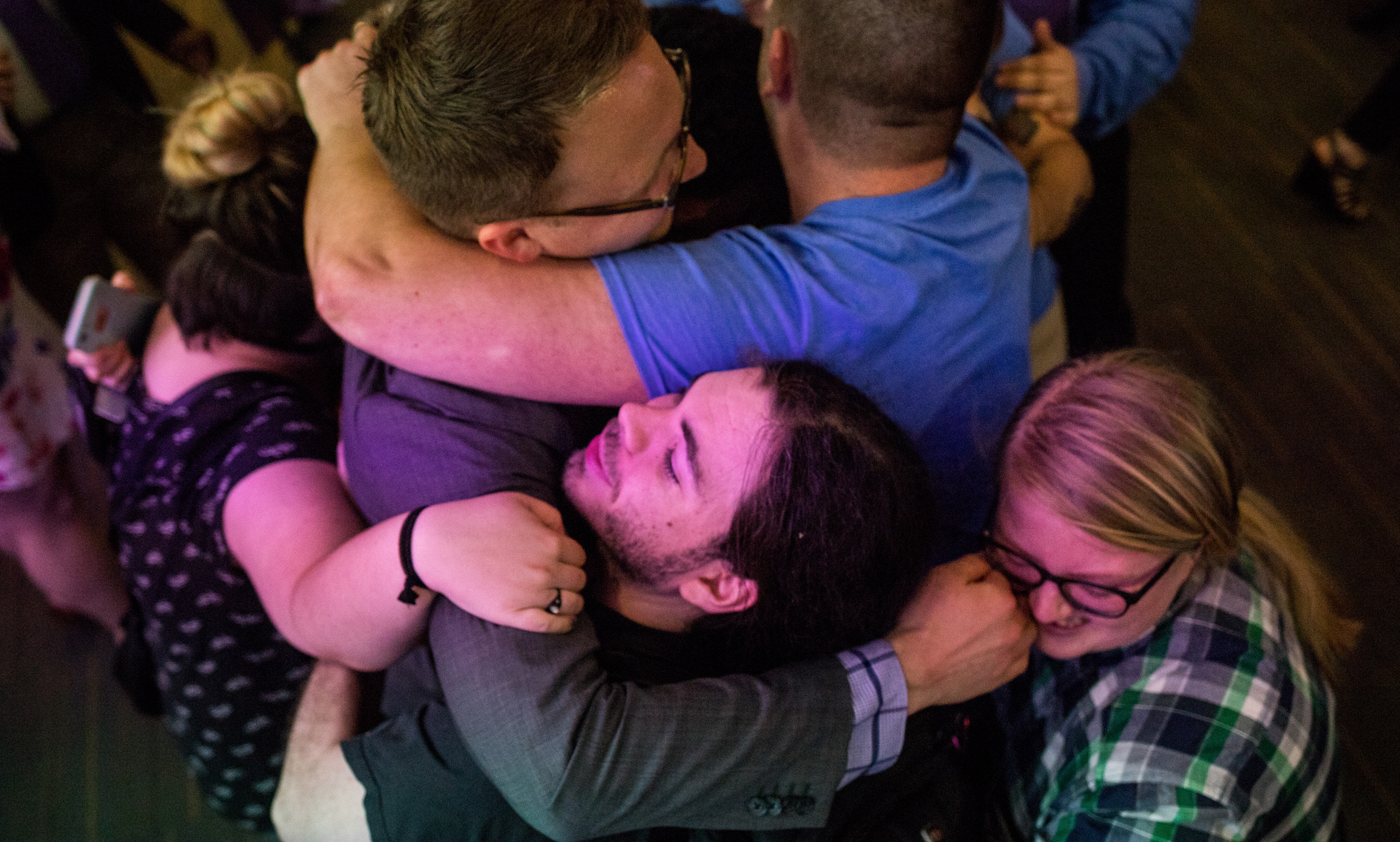
Awards recognize individuals who have contributed to the betterment of the UMKC LGBTQIA+ community
The Pride Awards recognize outstanding individuals who have contributed to the betterment of the university’s LGBTQIA+ community through education, support, programming or activism. These awards honor those who have contributed to the areas of service and outreach and establishing a safer, more welcoming environment at UMKC.
Nominations for the following Pride Awards will be accepted through Friday, April 24, 2020.
Outstanding Faculty/Staff Award
Recognizes LGBTQIA+ or ally faculty or staff who contribute to a positive campus climate for LGBTQIA+ individuals. This may be through offering LGBTQIA inclusive curriculum, expanding LGBT research in their discipline, challenging and working to improve campus policies and climate or proving thoughtful and inclusive programming.
Jim Wanser Award
This award recognizes an individual who has volunteered hours of service to the UMKC LGBTQIA+ community or the greater Kansas City LGBTQIA+ community. This person has gone above and beyond in helping to create a better community for all, and has served as a model of excellence for establishing community and volunteering.
Rising Star Award
Recognizes one area high school student whose leadership and service have resulted in a tangible gain for LGBTQIA+ students (such as a Gay/Straight Alliance), or whose energies have created a more friendly, inclusive environment at their high school.
Outstanding Alum
Recognizes one UMKC alum who works toward fostering an inclusive community at UMKC or in the community in which they live and work. Their commitment to the LGBTQIA+ community serves as a model for current and future UMKC alumni.
Collaborative Excellence Award
Recognizes departments whose collaborative efforts have resulted in new or improved resources and services for LGBTQIA+ students, faculty, staff or community members.
LGBTQIA Student of the Year
Recognizes one student for outstanding leadership, dedication, and service within the university or community, that has resulted in new or revitalized resources, services, or programs for the LGBTQIA+ community. This individual serves as a role model for their peers, and demonstrates a commitment to queer leadership, advocacy, activism, or education.
Read more about each award and submit a nomination
Apr 06, 2020
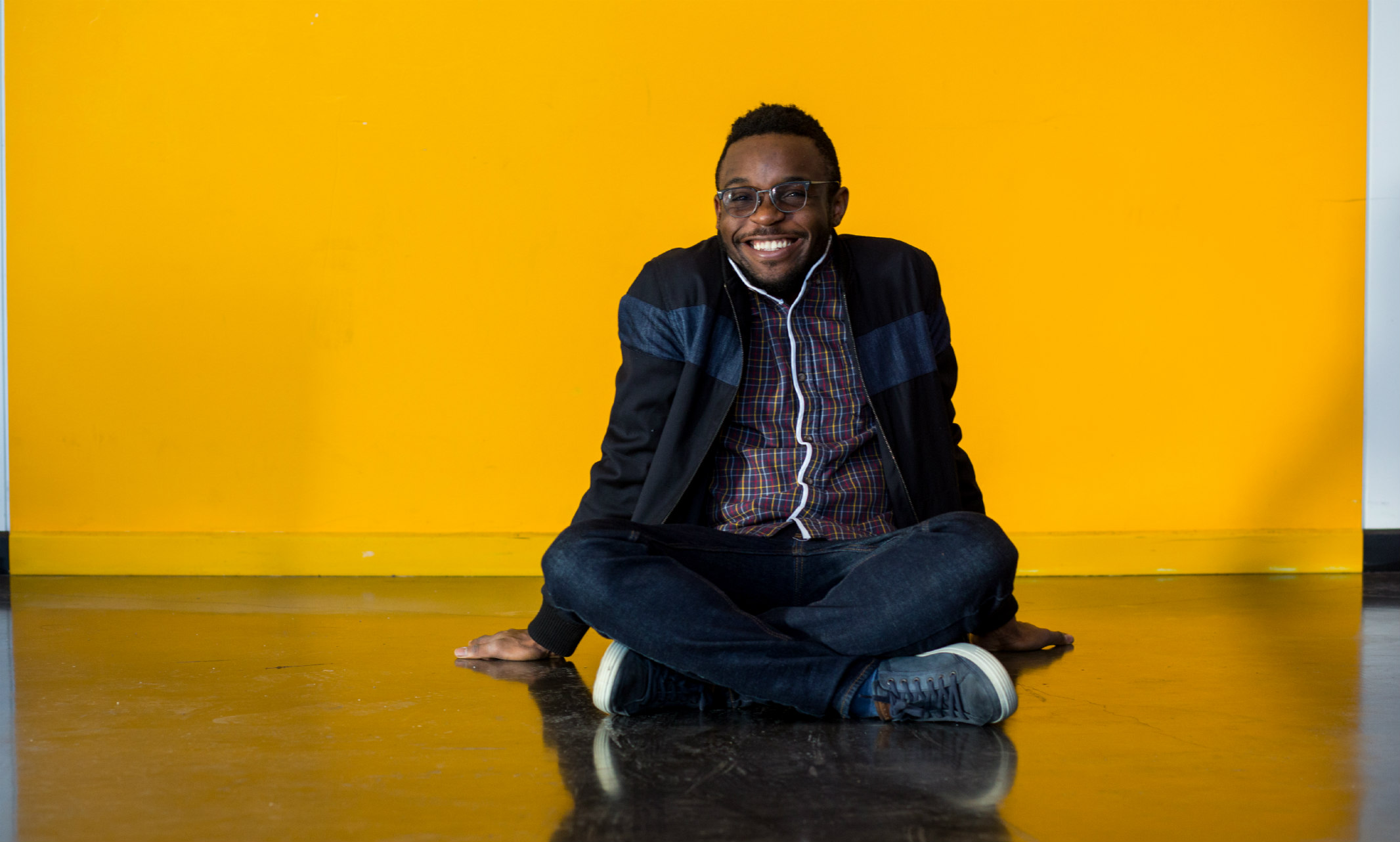
Engineering major Joshua Koni is coping with the challenges
As students and faculty are adjusting to online classes, socially isolating and the advantages and challenges of learning and socializing via Zoom, Joshua Koni, a current international student ambassador had to make the decision to stay in Kansas City or return to his home in Cameroon in central Africa. He decided to stay and is making adjustments as he juggles school and the separation from his family and friends.
How have you been adjusting during the transition?
I am trying to stay positive. My situation could be so much worse. I was in an apartment with a roommate and I had about a week to decide if I should go home, stay with my roommate or move in with my host family. I’ve known them for the last five years and they are great. It was hard to know what to do, but I decided to stay with my host family. Now I’m living in a house with nine people.
How have you been managing?
It’s been fine. For a while, we were taking turns going to the grocery store, so we had the opportunity to get out a little. But as we had more information we were concerned about the virus spreading further with the more people who are out. Now we’re having groceries delivered and are pretty much home all the time.
Being isolated is challenging. How are you handling it?
Mostly, I feel very lucky. Some international students could not find families to stay with in the United States. Online school and Zoom classes are a significant adjustment.
"It was hard to know what to do, but I decided to stay with my host family. Now I'm living in a house with nine people." - Joshua Koni
What’s working for you?
First of all, I’m glad we have Zoom! It’s been a good tool for me and I am mostly finding the resources that I need. I know that some of my teachers are using Zoom for the first time. We are all working through the challenges.
What’s the biggest adjustment?
The lack of interaction is difficult. Sometimes I am recording classes and watching them later. It gives me the opportunity to move through things I know and focus on new information.
What’s your most significant personal challenge outside of school?
Isolation from my fellow students and friends. A lot of my friends are international students who went home, but I was able to talk to one of my friends who had gone back to France. She said she’s also struggling with motivation.
Does the situation make you anxious?
Yes. It’s especially difficult because we don’t know how long we’ll be in this situation. I know it’s been hard for some of my friends to stay home and isolate. Spring break – when we did not have classes – was even more challenging.
"I think we need to remember that we are in this together."- Joshua Koni
How are you managing that anxiety?
Part of it is just not having enough to do to stay busy. I play guitar and I’ve been coloring this map, which has been a good way to spend time. I’m not much of a gamer, but I am giving it a try with my host family. It’s a good way to spend time with them.
I’m in touch with my family back home, which also helps. They are doing well. They haven’t had the order to stay home, so their life isn’t that different.
You were responsible for volunteers for Culture Night, one of the largest events, this year. It must have been disappointing when that had to be cancelled.
Yes, it was something that I really enjoyed doing. It seemed like a full-time job planning it, but it felt good to be a contact person for the new students. A lot of students – not just international students – look forward to the festival. But once we became aware of how things were escalating in New York, we were concerned about the number of people who might be exposed. We are hoping we will be able to reschedule early in the fall semester next year. We haven’t gotten a decision on that, but that would be ideal.
You are in a safe place and have good support systems. Do you have any advice for other students on handling this situation?
I think it’s good to be conscious that this is a hard time. Sometimes I feel guilty in one sense – because I had options – but I am so grateful. I think we need to remember that we are in this together. It’s been great to see the emergency funds that the university and the Student Government Association have raised. People shouldn’t hesitate to take advantage of those if they need them.
And I think it’s a good idea to have fun when you can. There’s nothing wrong with a virtual happy hour!
My hope for other students is to remain positive and hopeful during this time, find something to do in addition to doing schoolwork and stay connected with organizations. Video call friends and family members, get enough sleep, work out with a friend virtually, start a puzzle or board game, paint something, play an instrument, bake some bread. Above all, play your part in slowing the spread of the virus by washing hands and staying home.
Apr 06, 2020
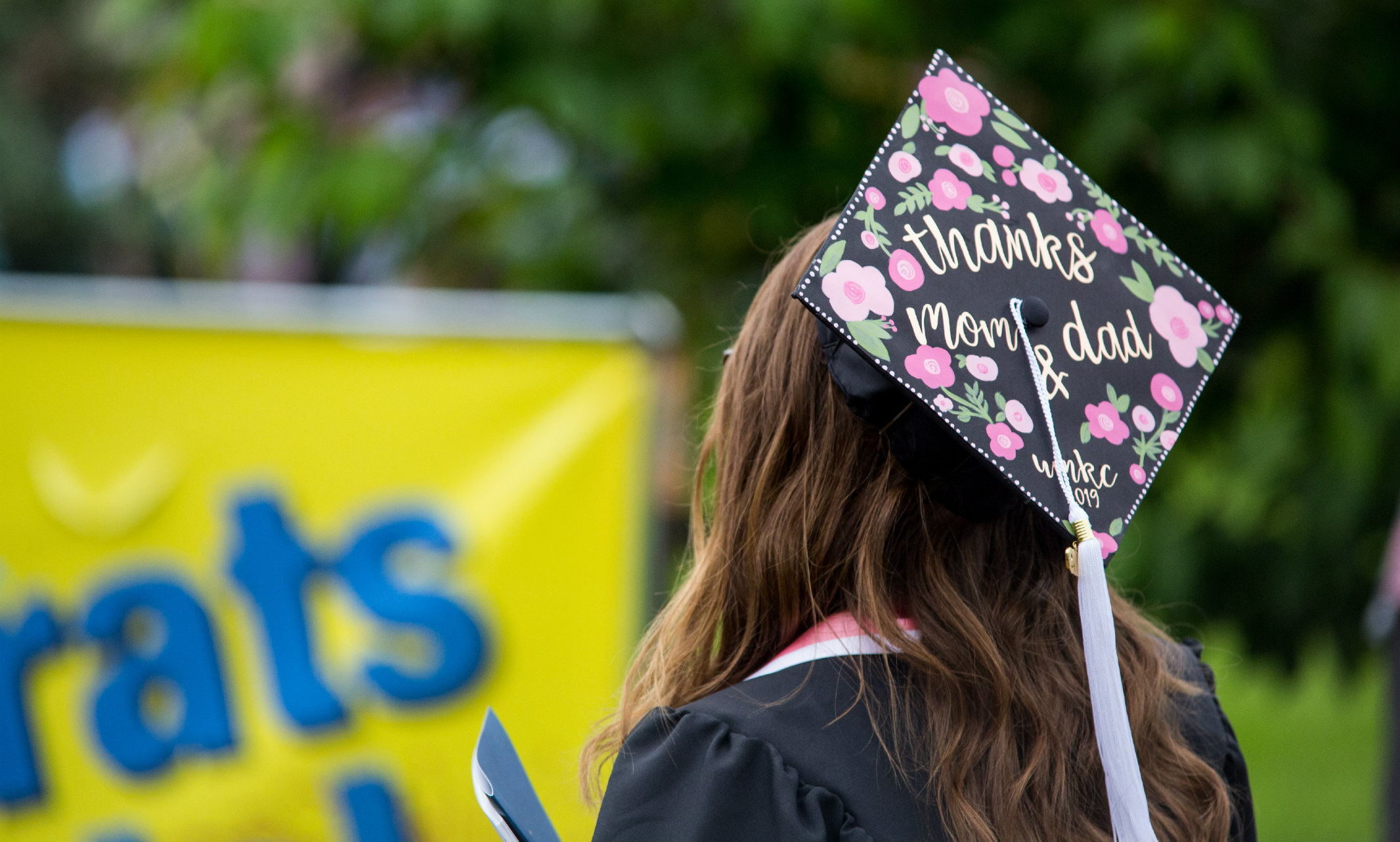
Students will also have opportunity for-in person celebration in December
The University of Missouri-Kansas City is planning a virtual commencement for May graduates, with details to be influenced by a survey of graduates and their families.
The decision is in keeping with the announcement by the University of Missouri System that all four UM universities were postponing in-person spring commencement exercises, with each university making individual plans to celebrate graduates.
UMKC will conduct a two-pronged commencement celebration, with May graduates invited to participate in both the virtual commencement in May and to walk the stage in traditional cap and gown in December.
All students who completed requirements for graduation will still have degrees conferred upon the regular schedule.
In a letter to pending graduates and their families from Chancellor Mauli Agrawal and Interim Provost Jenny Lundgren, they said: “We know what a treasured tradition and milestone commencement is for our graduates who have worked long and hard for their diplomas. At the same time, we must address the need to keep our campus community, as well as our graduates’ families and loved ones, safe and healthy.”
“In May, we fully intend to find a fun, creative way to celebrate graduation and commencement virtually, with survey input from our graduates,” they wrote. “In December 2020, we also will plan to host our biggest in-person commencement celebration ever, inviting May and December grads to march across the stage and receive their diplomas.”
The campus is planning virtual ceremonies for each school with recorded speakers, special mailings, messages and more to ensure students have a celebration worthy of their accomplishment.
Apr 02, 2020
Even though they can't physically come to school, they can still feel part of the community
UMKC's Moriah Stonehocker, a student teacher at J. A Rogers Elementary in Kansas City Public Schools, and Jennifer Waddell, director of the Institute for Urban Education at UMKC, were interviewed on KCUR regarding teaching in online classrooms.
Apr 02, 2020
Program has funded 129 projects, helped create more than 65 companies
DigitalSandbox KC awards grants to early-stage entrepreneurs and connects them with mentors and other resources to transform ideas into viable businesses. "Now, more than ever, we need to support our early-stage companies with programs like Digital Sandbox KC," Jill Meyer, senior director of technology ventures at the UMKC Innovation Center.
Kansas City Business Journal
Startland News
Apr 01, 2020
